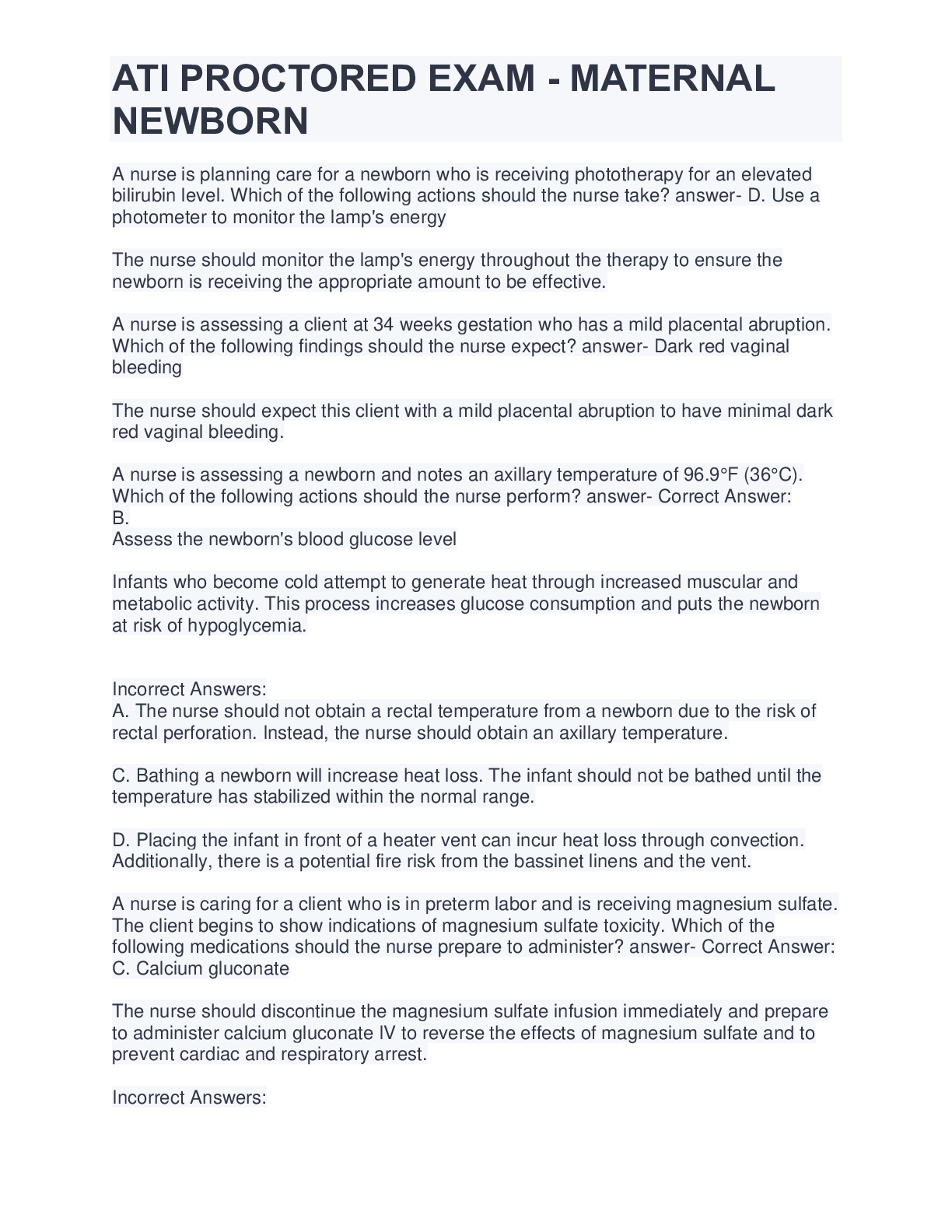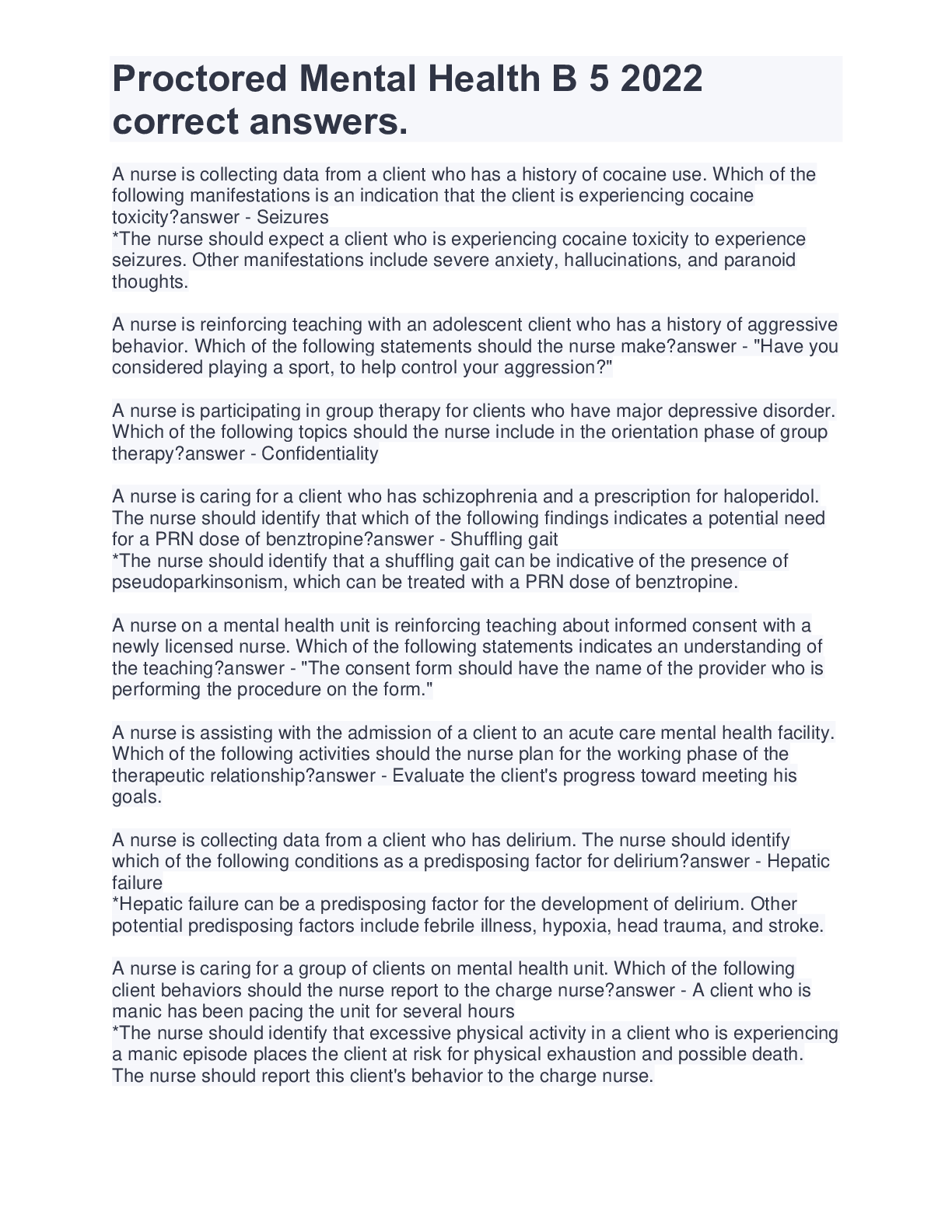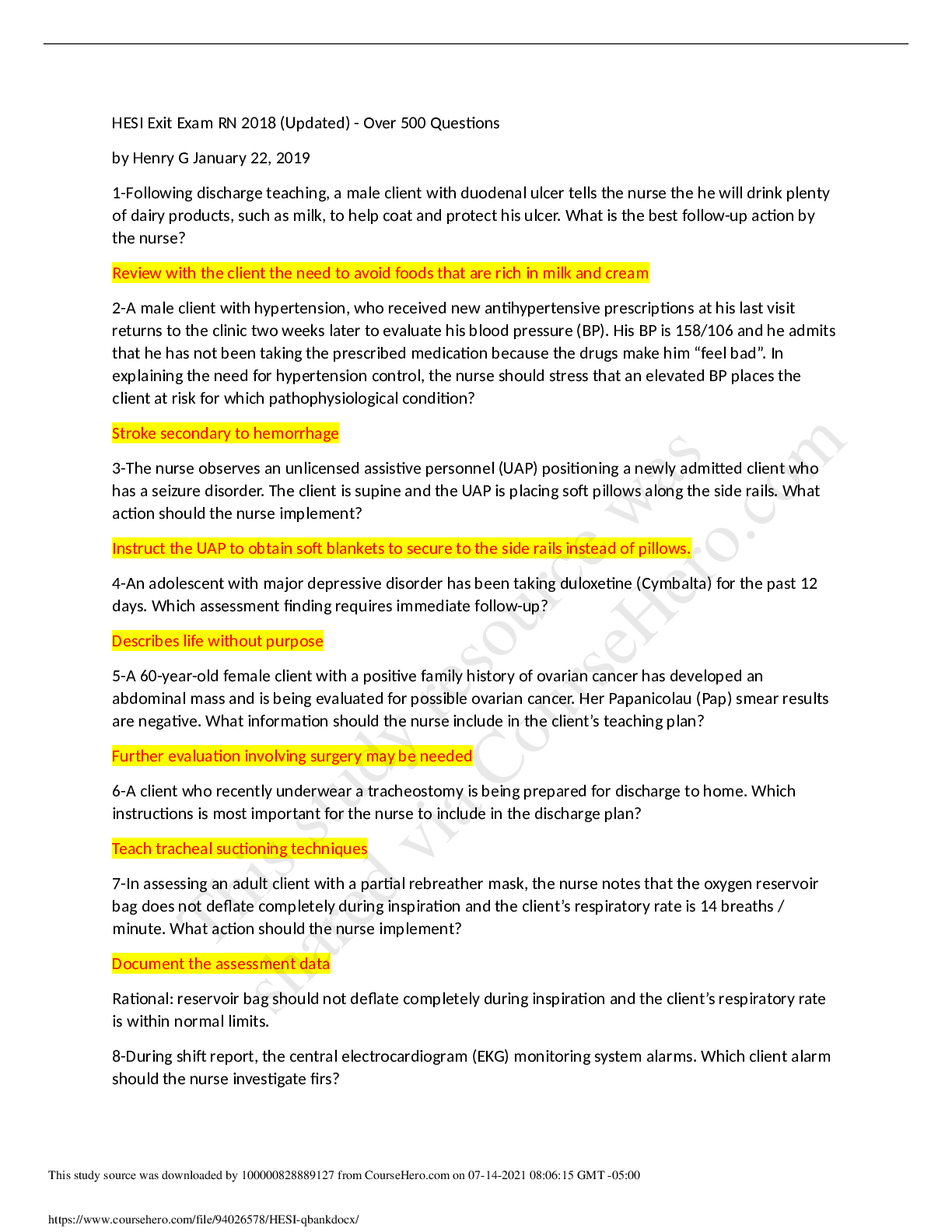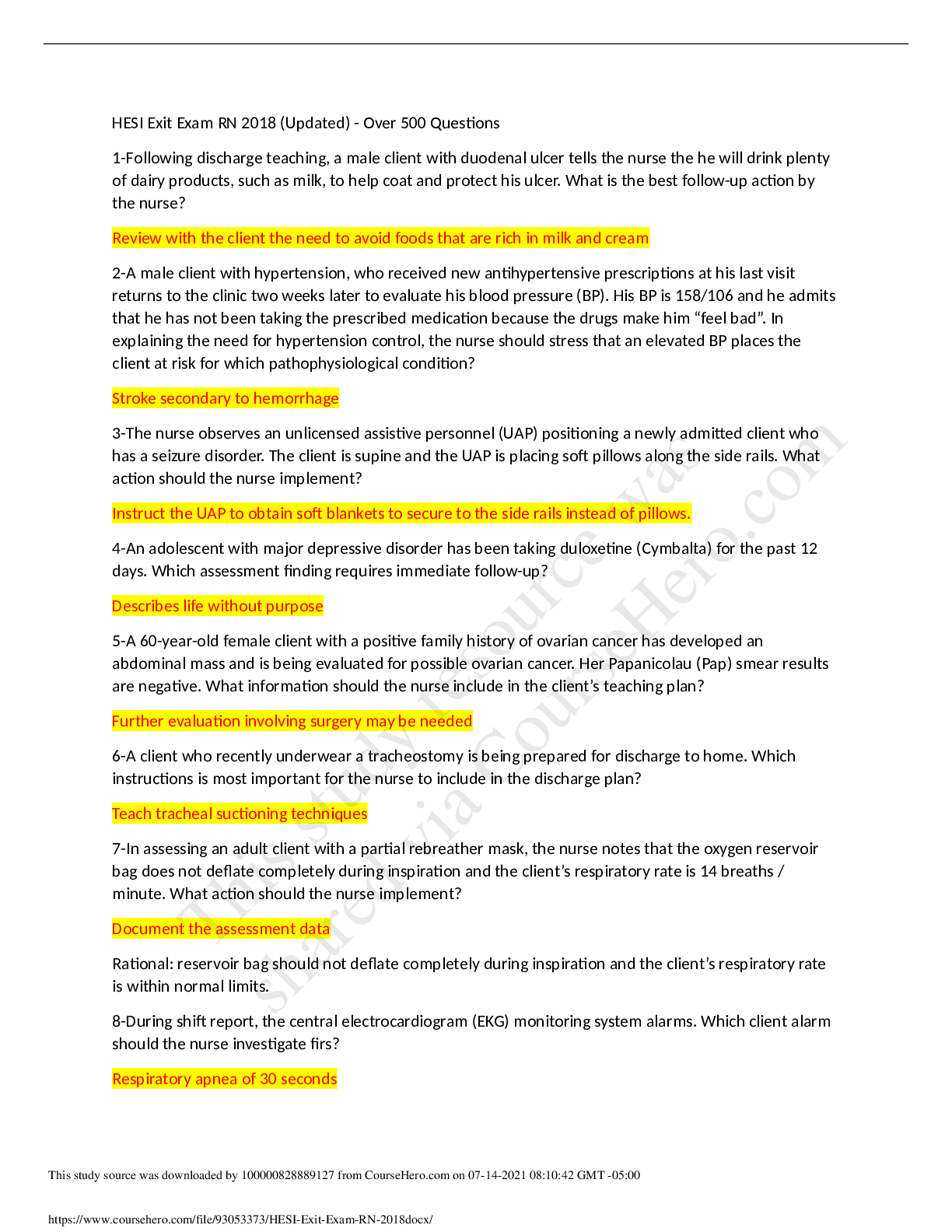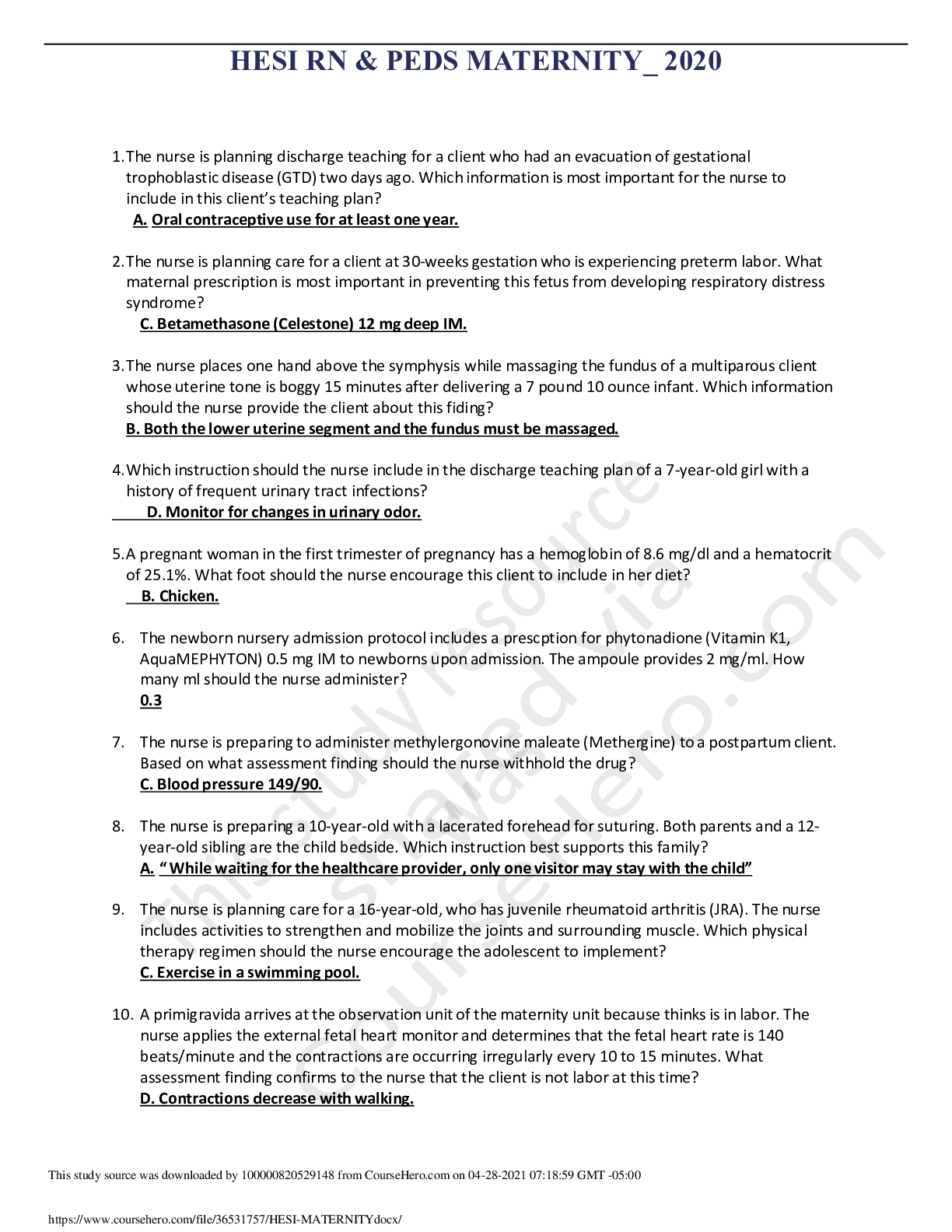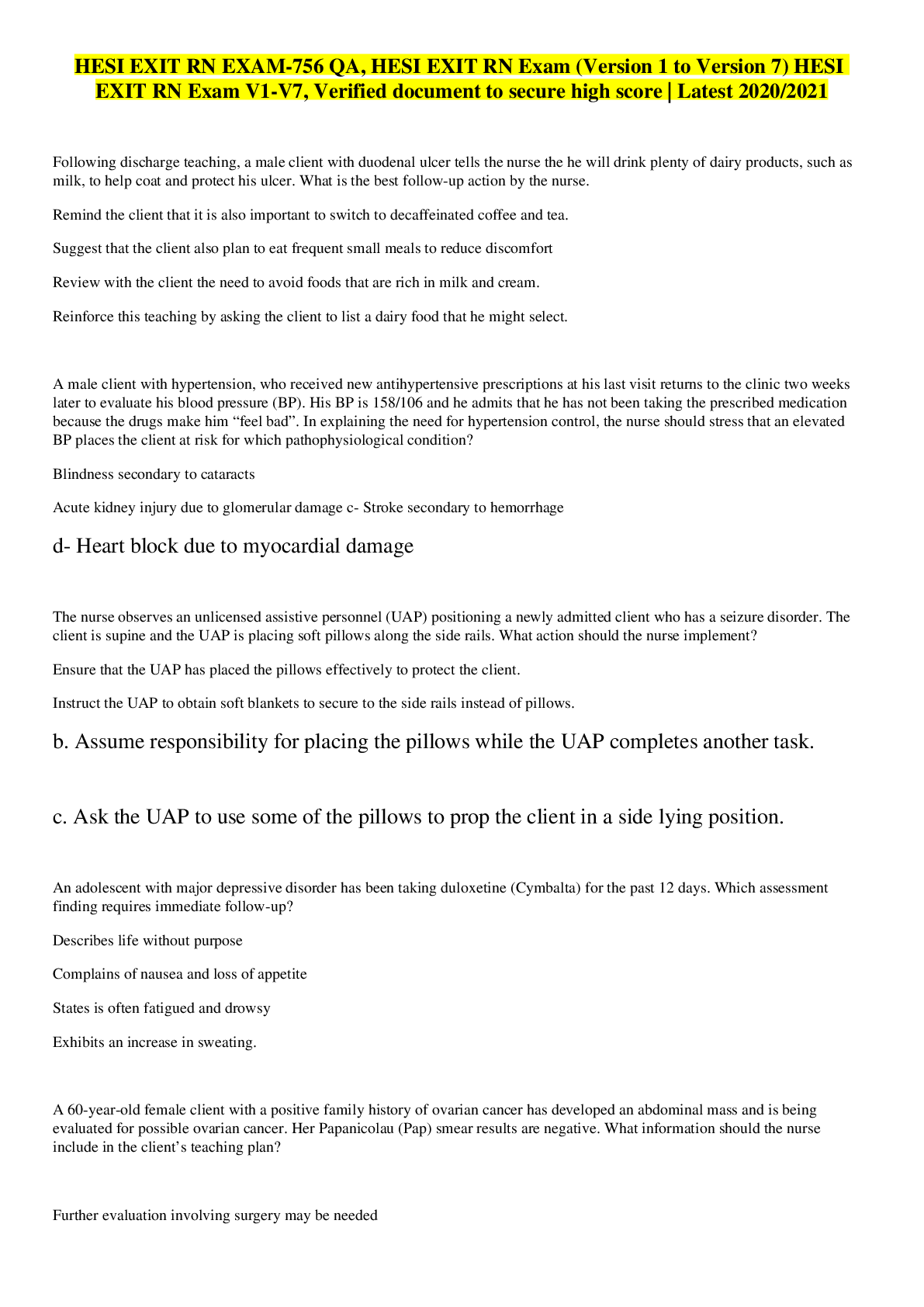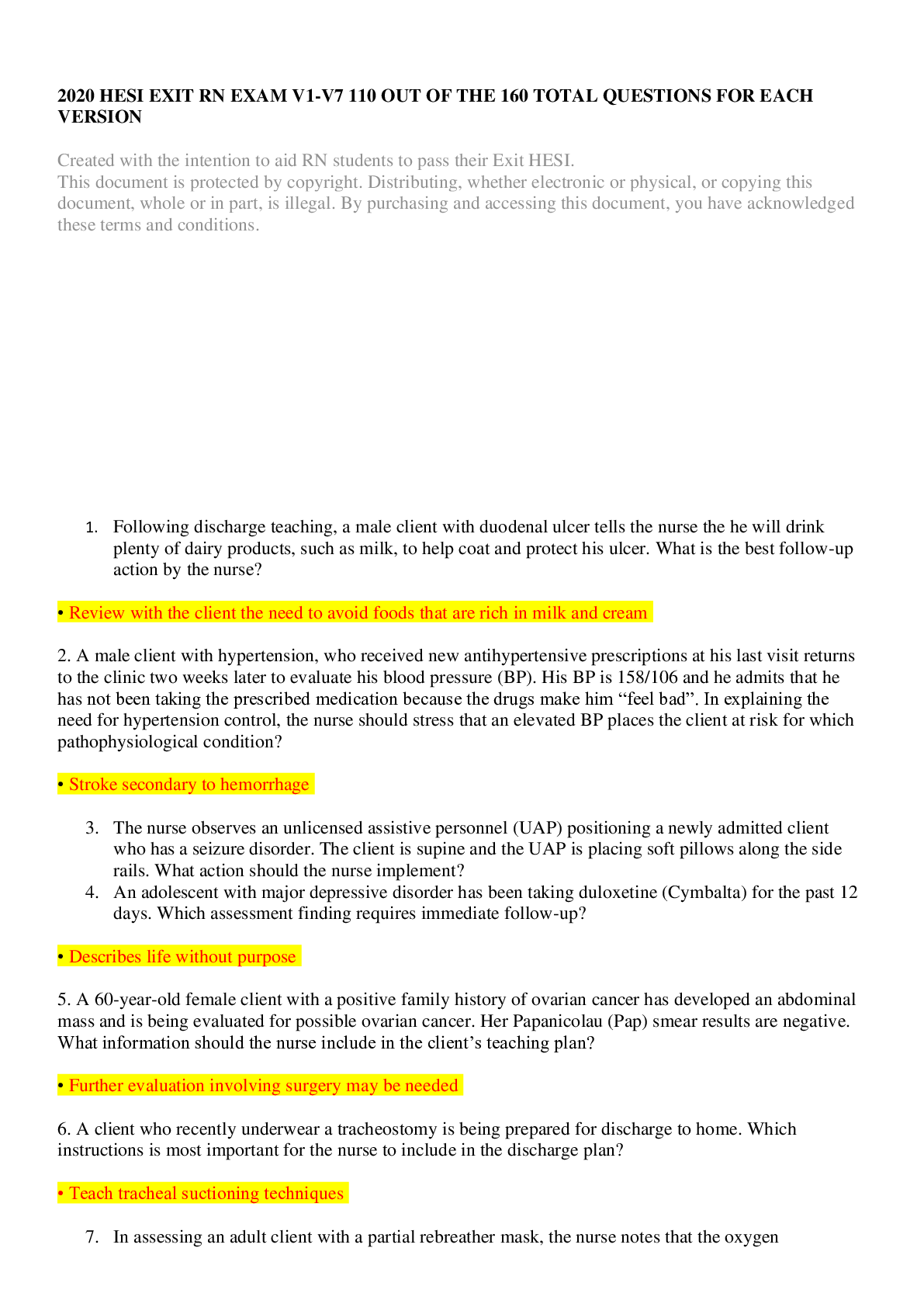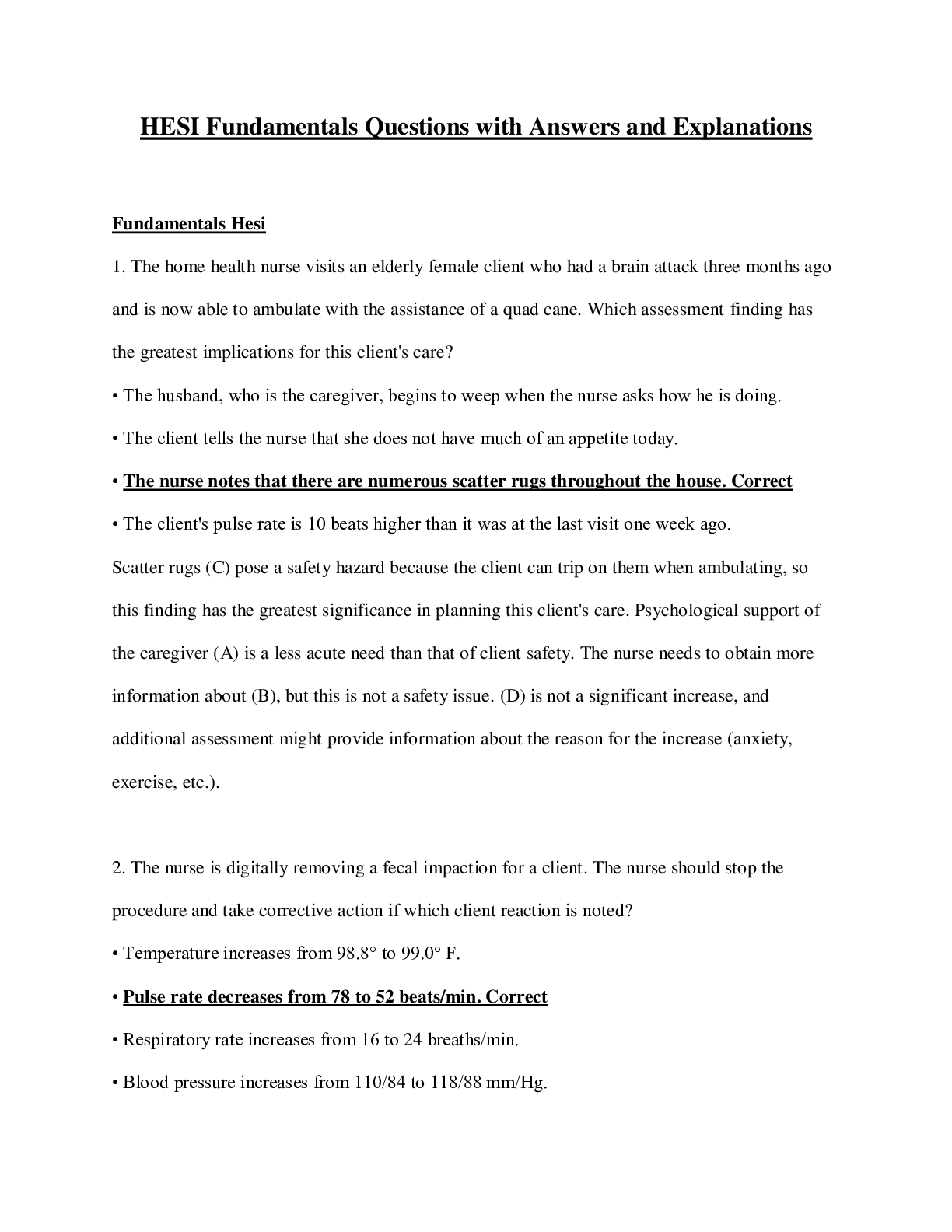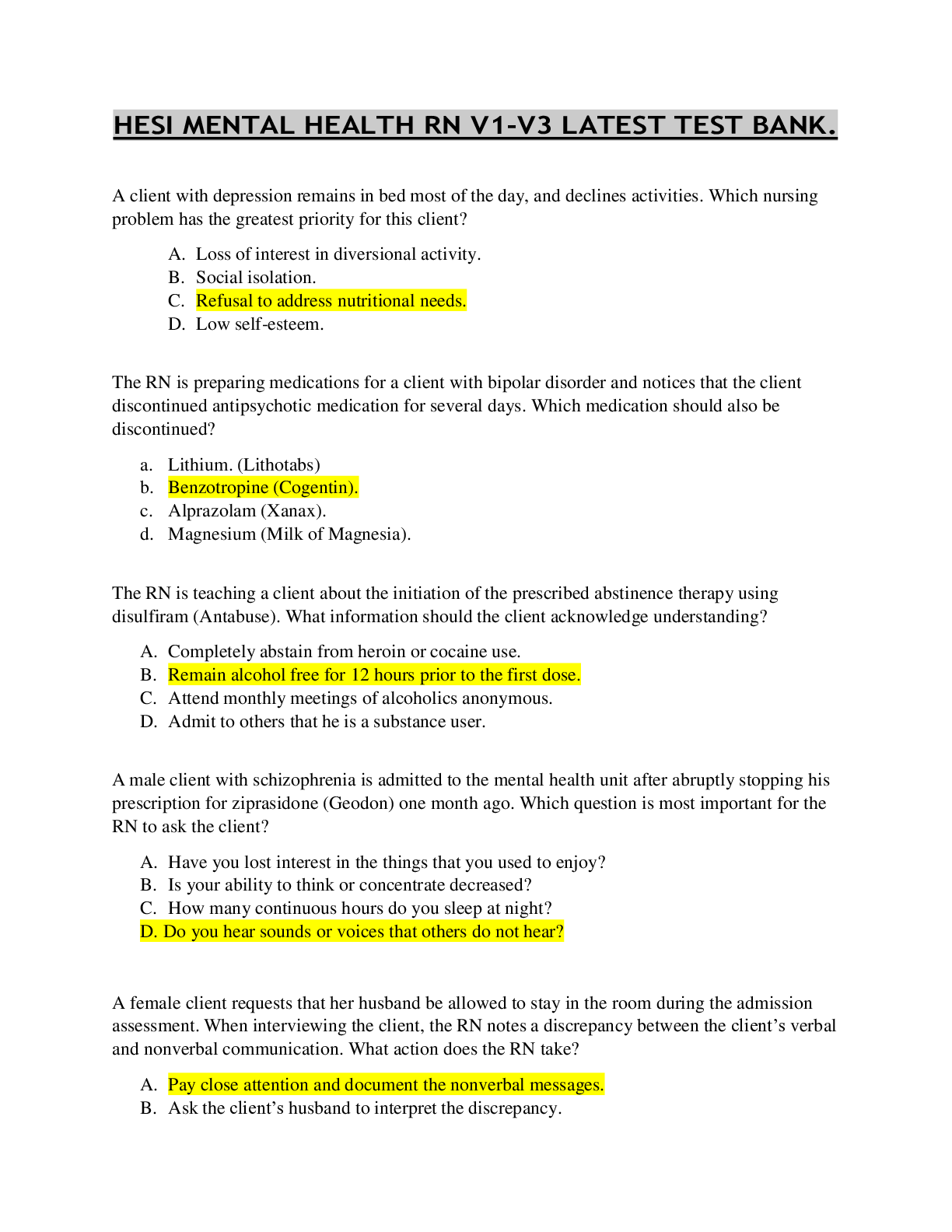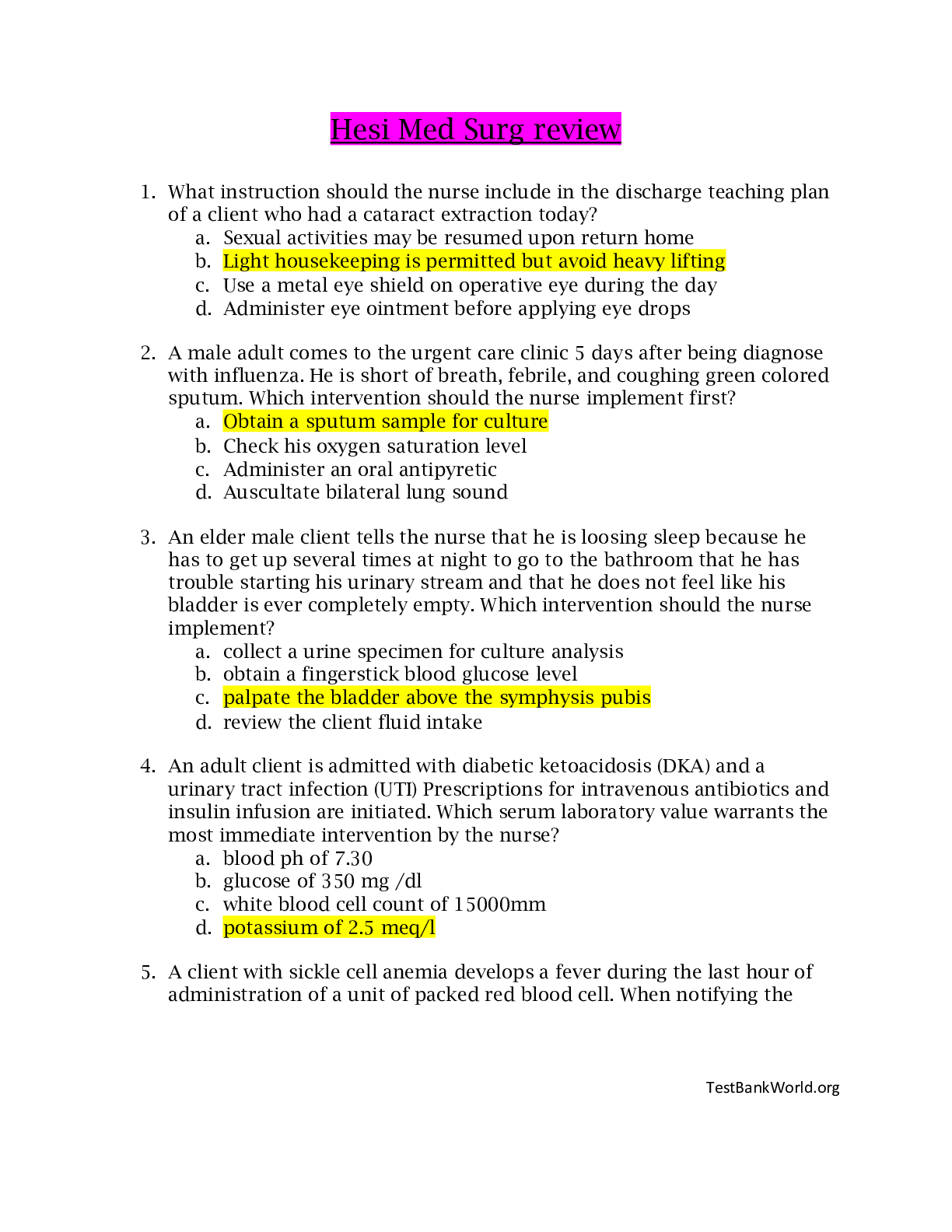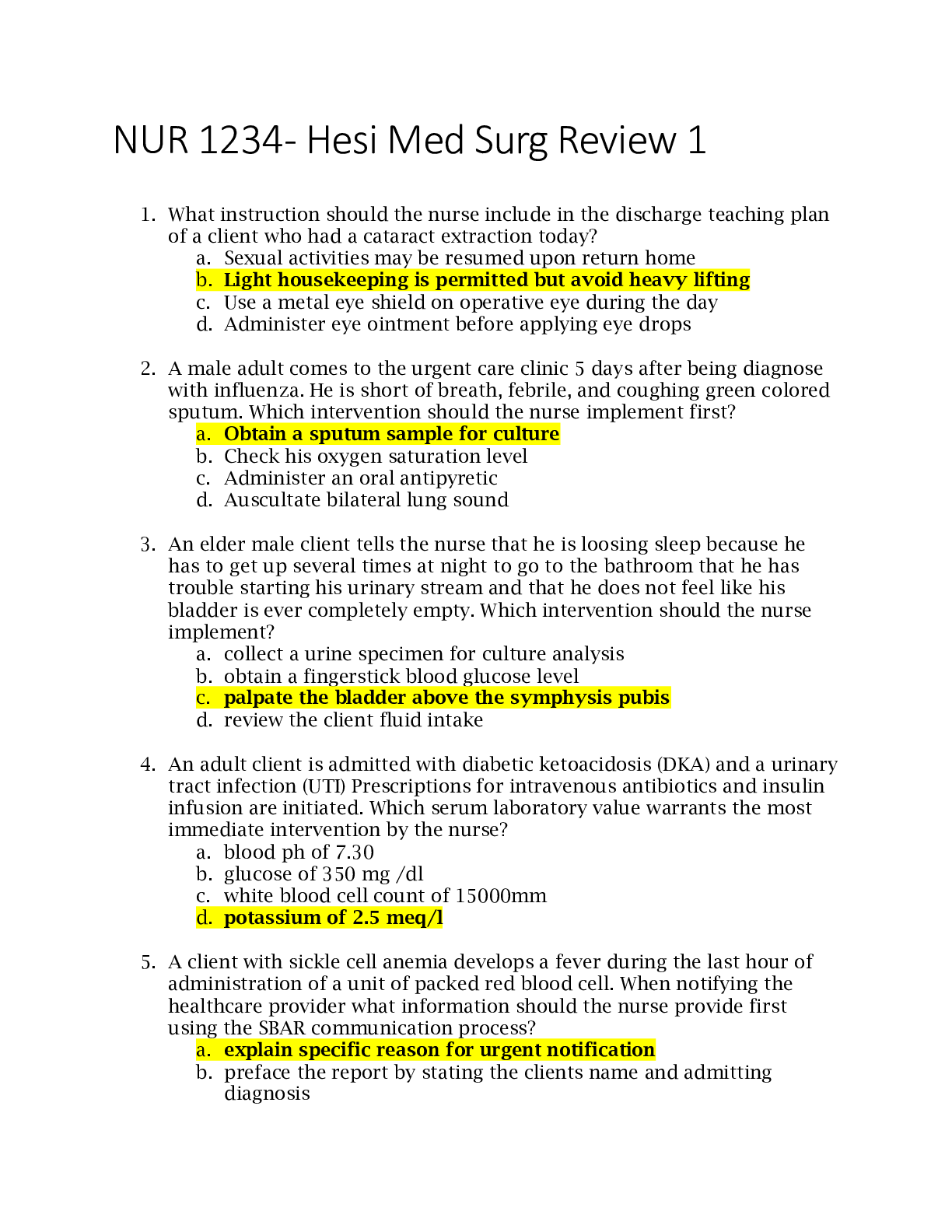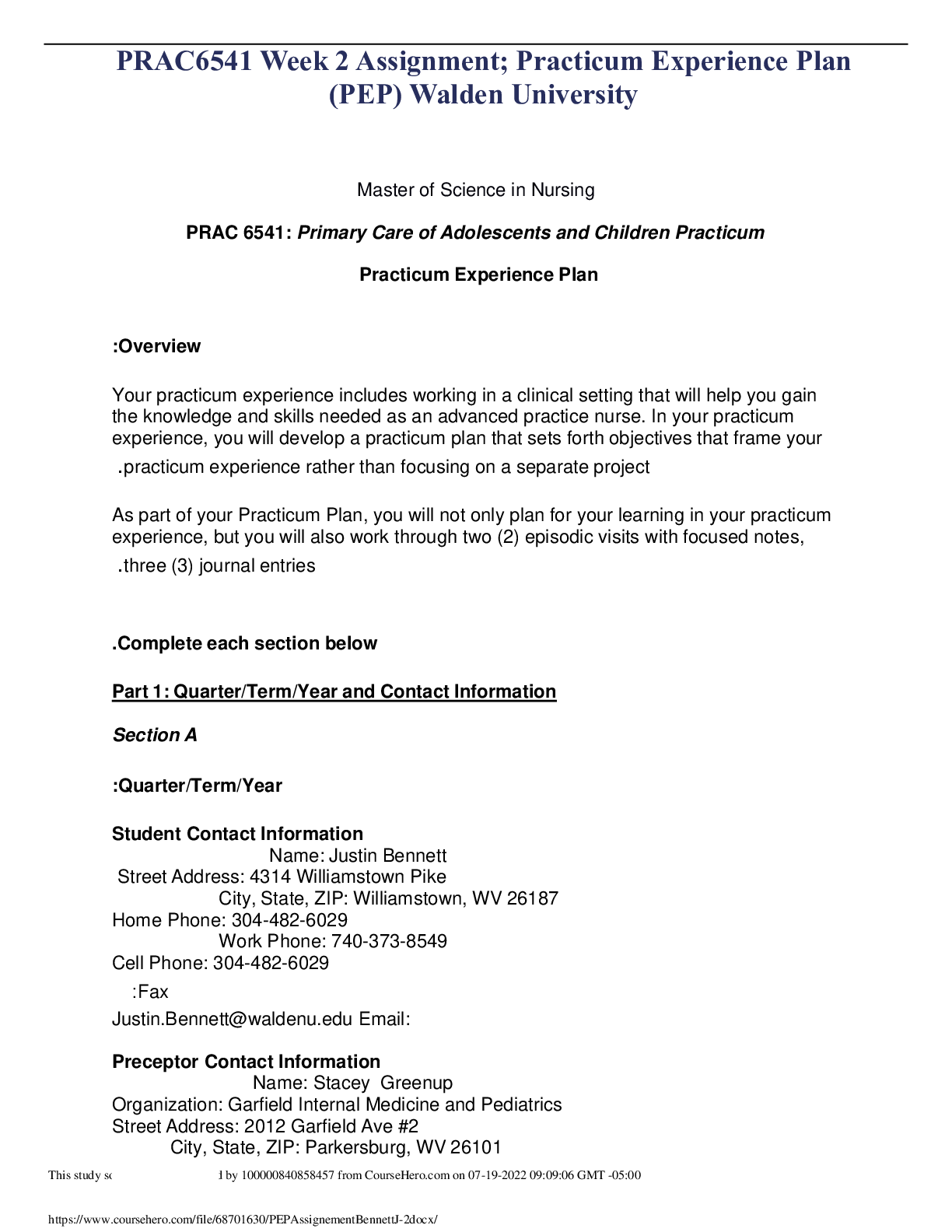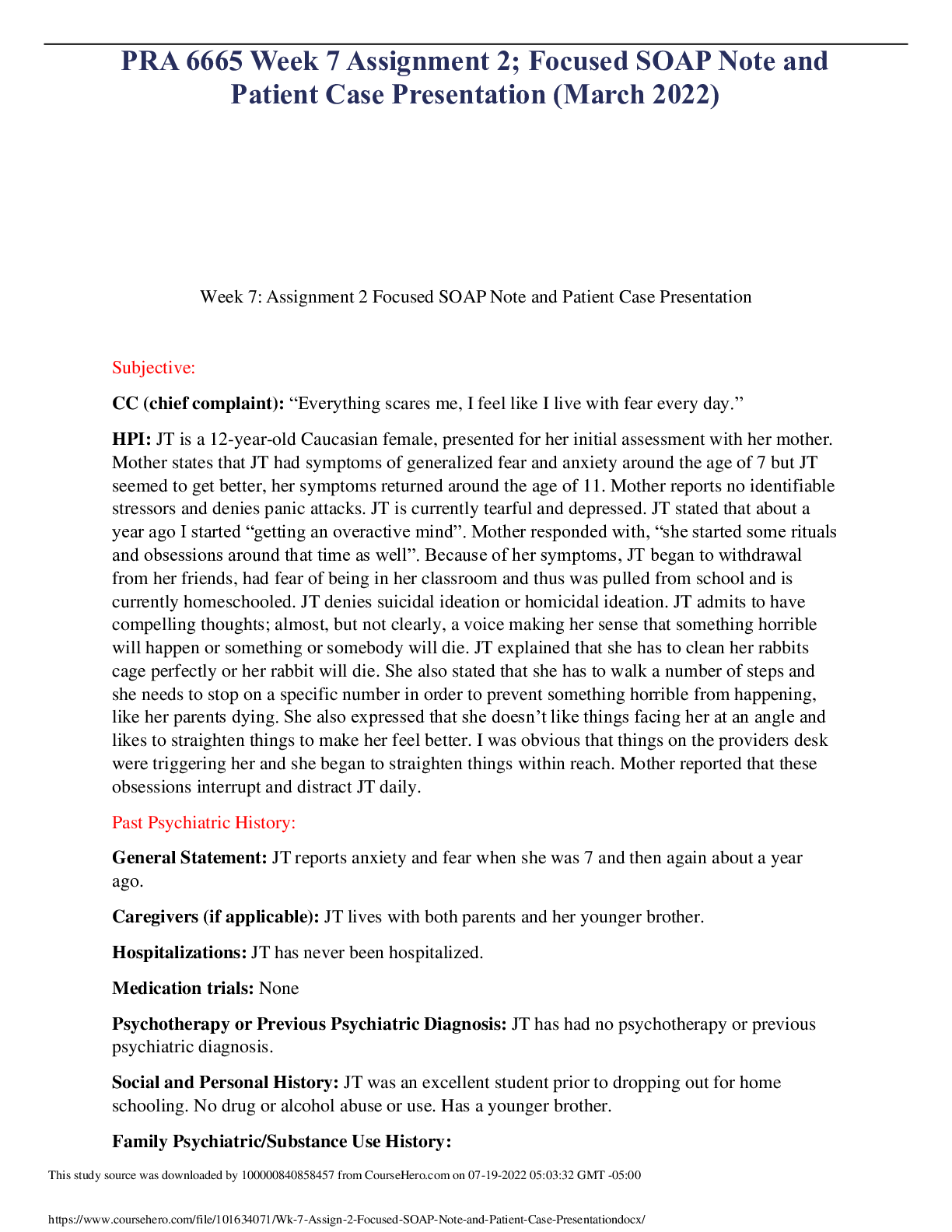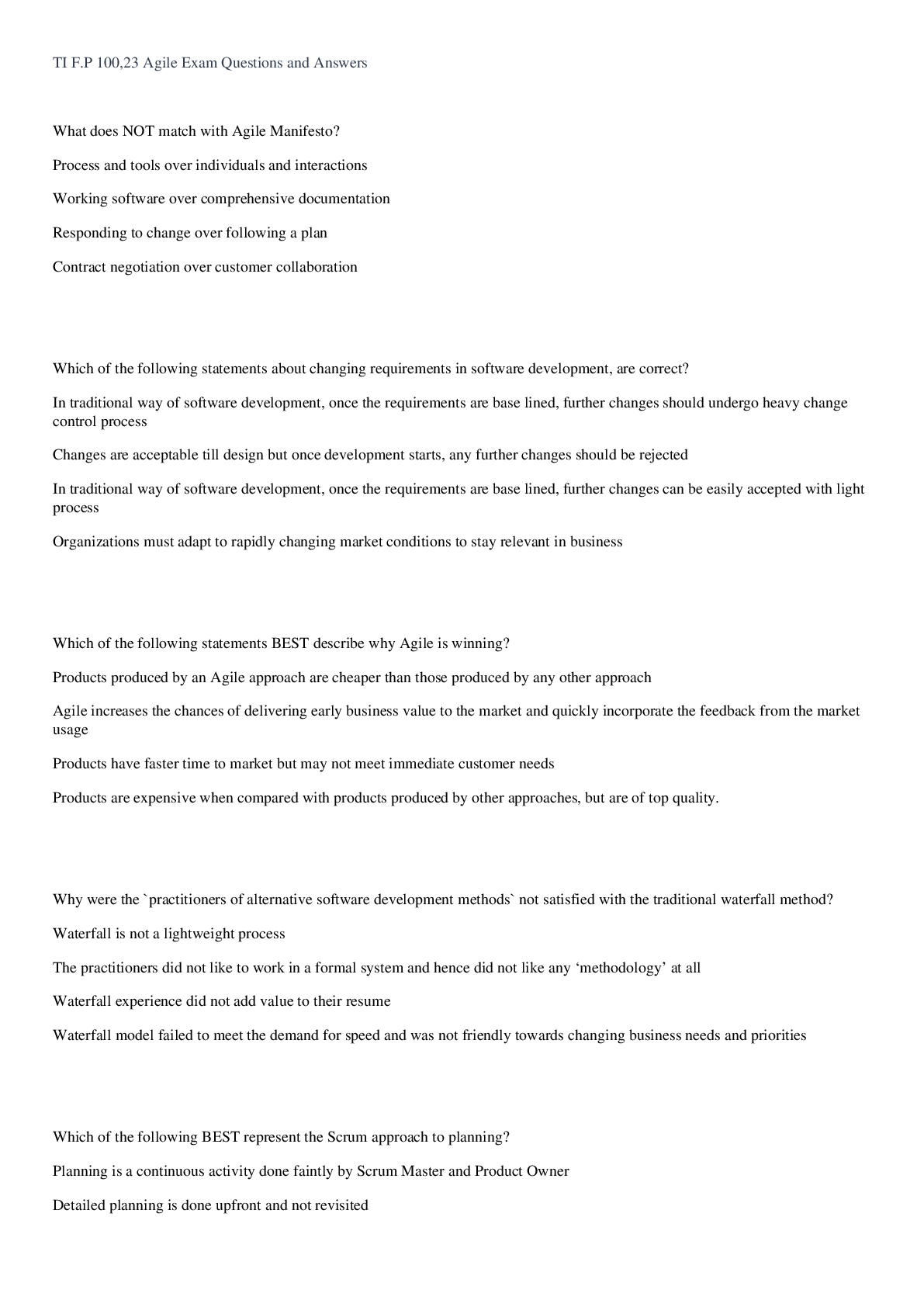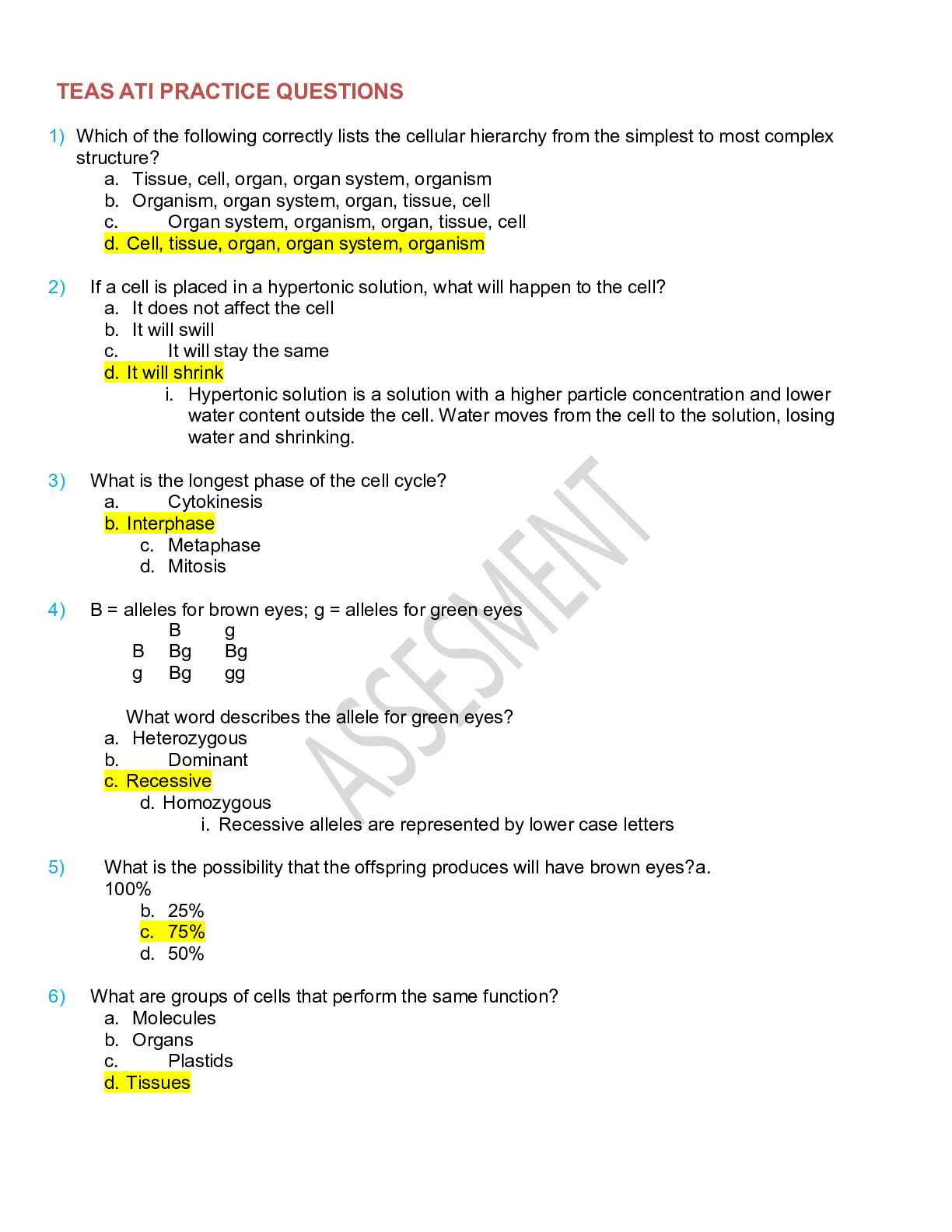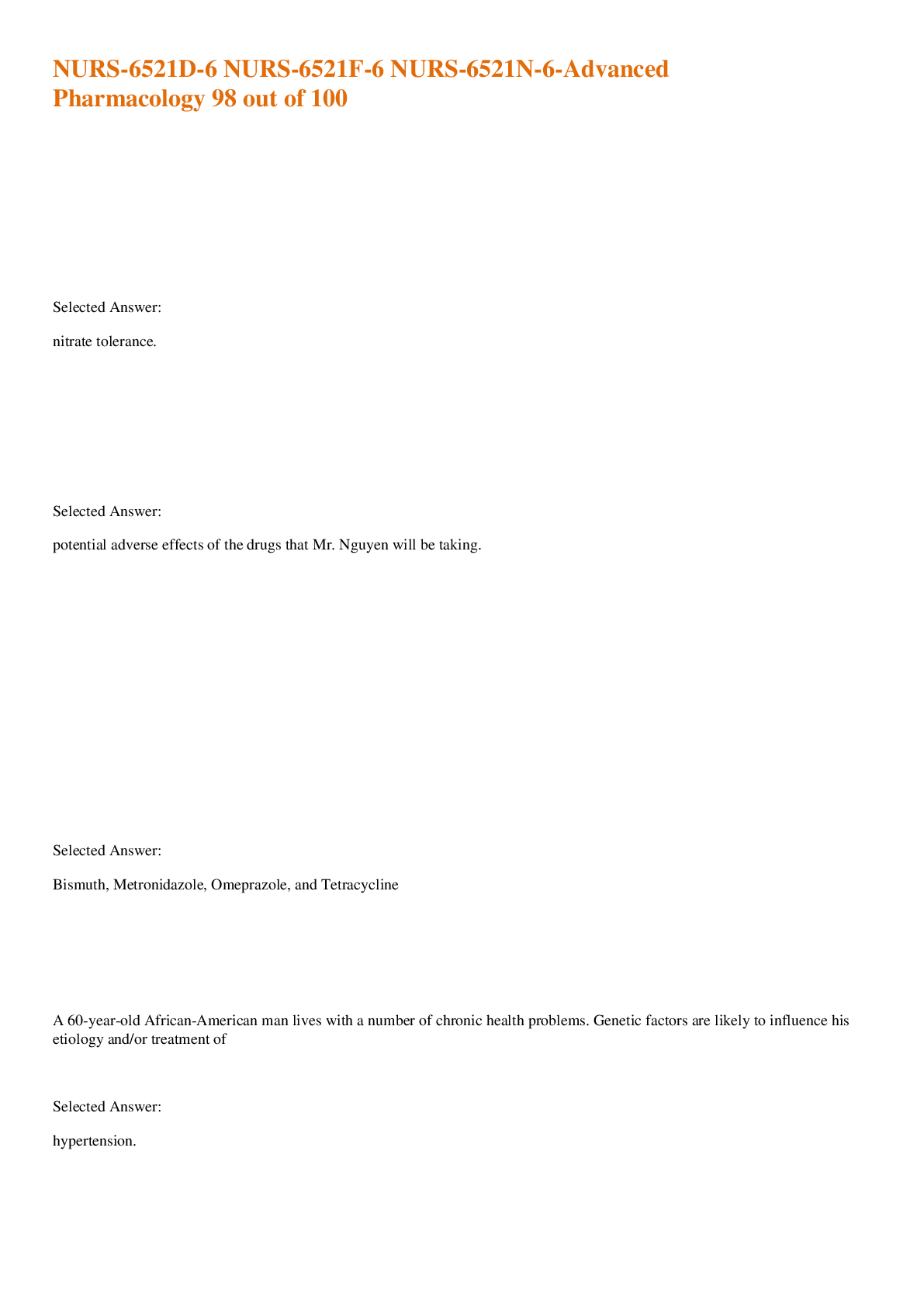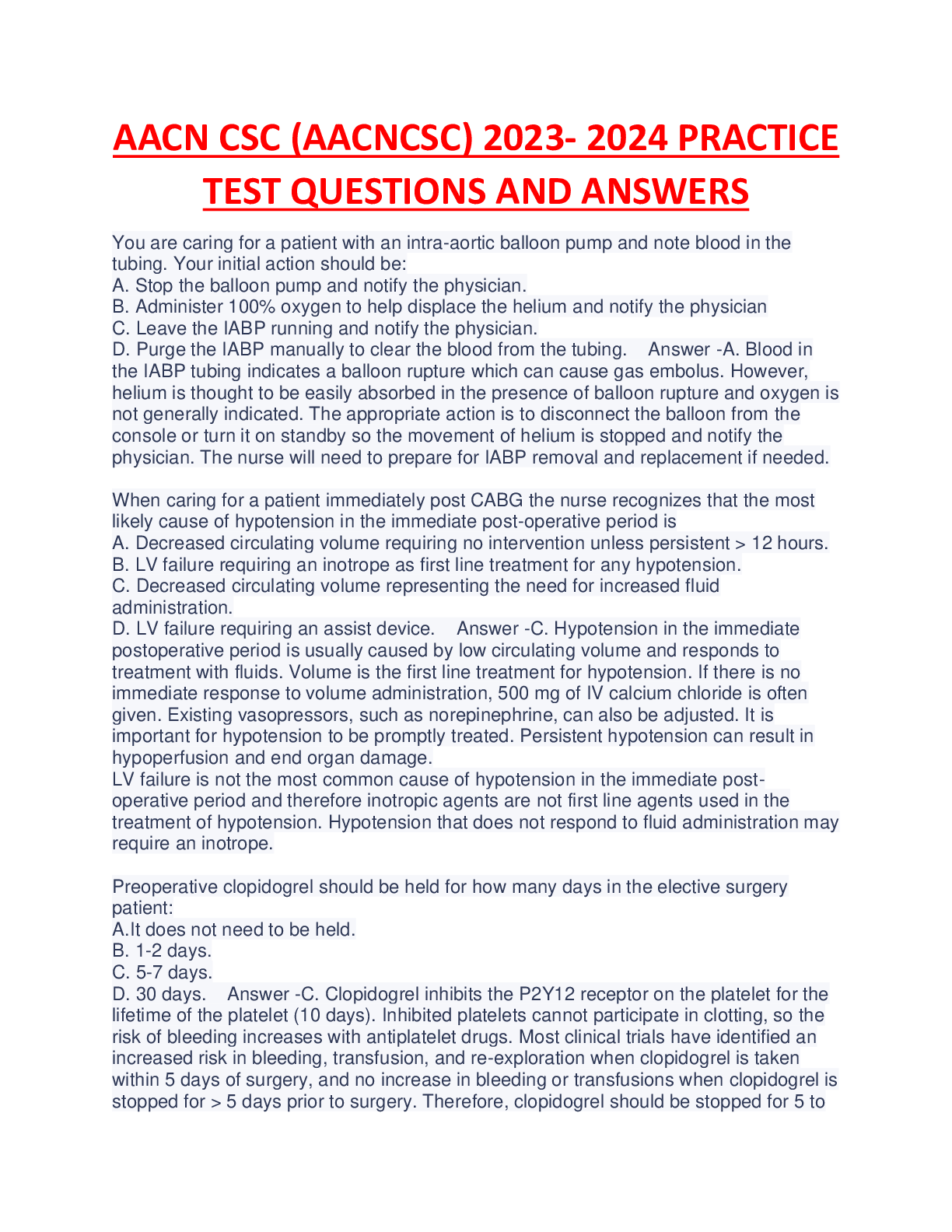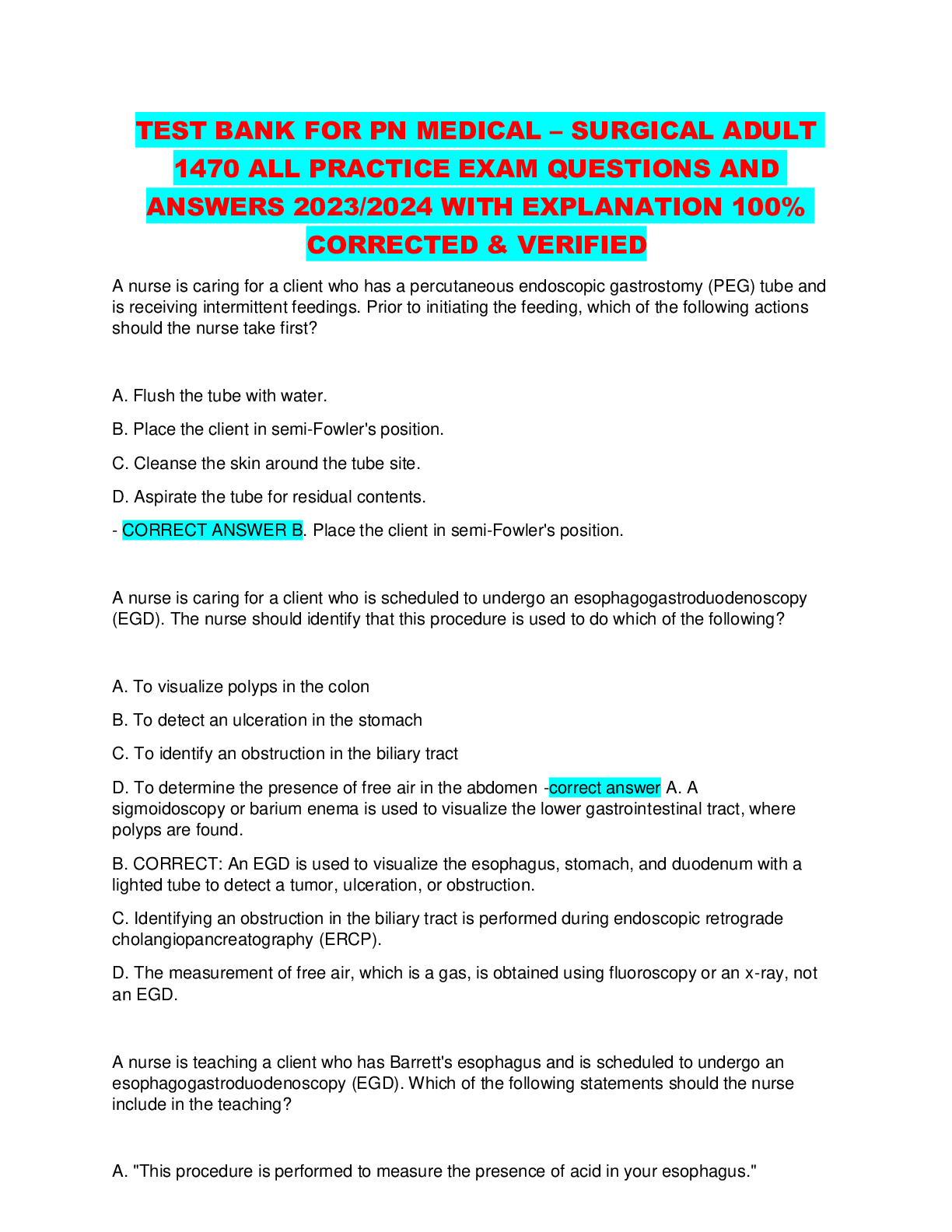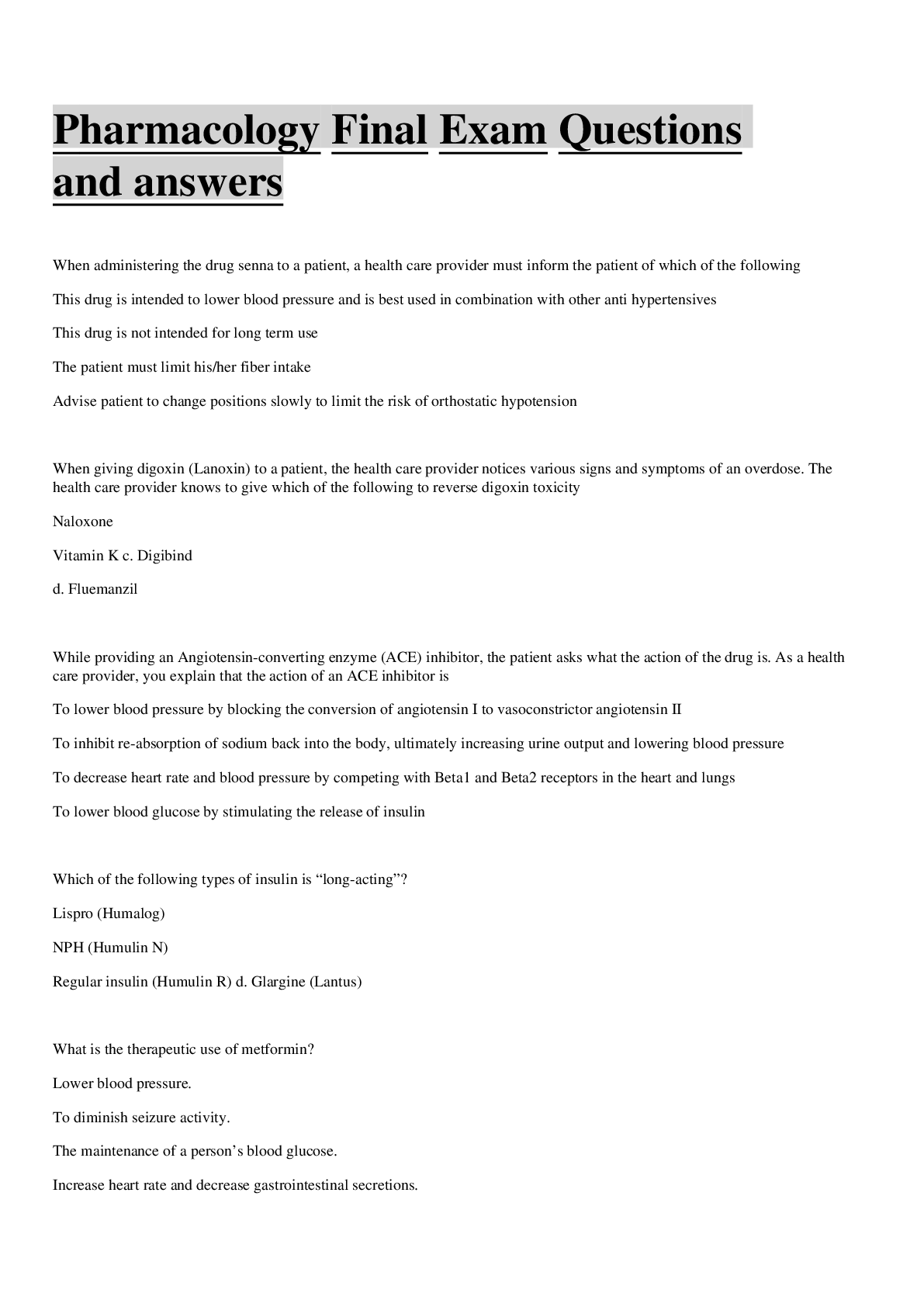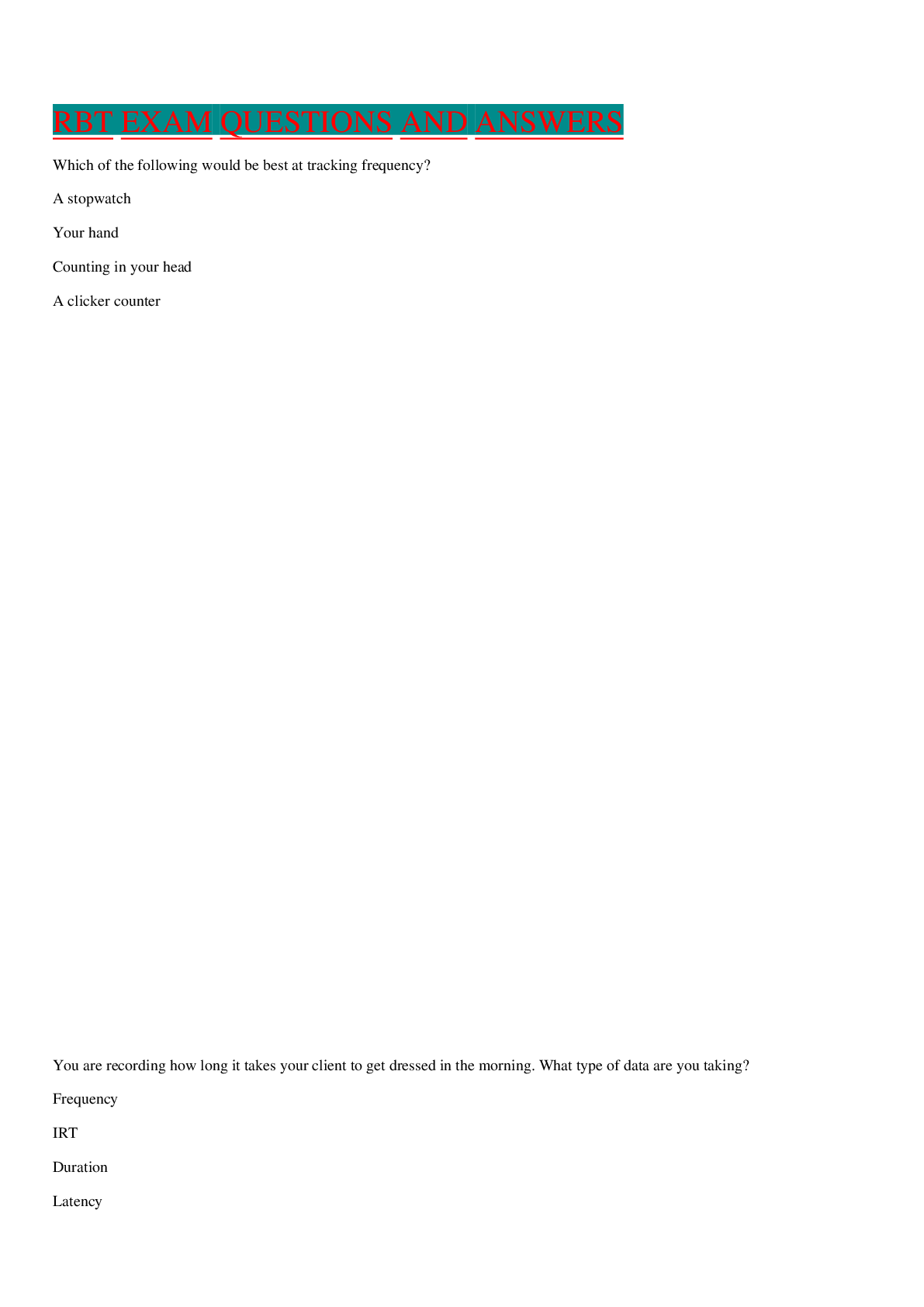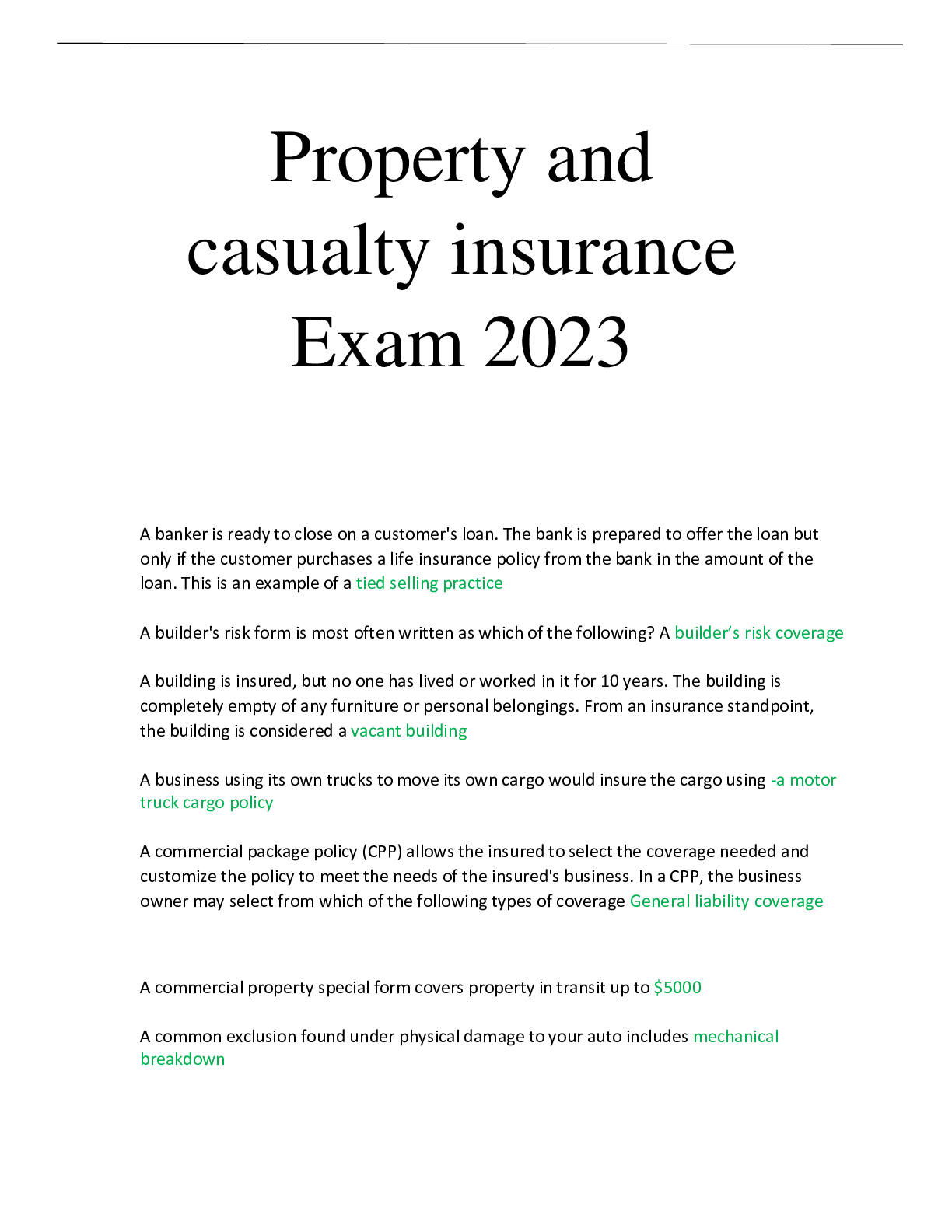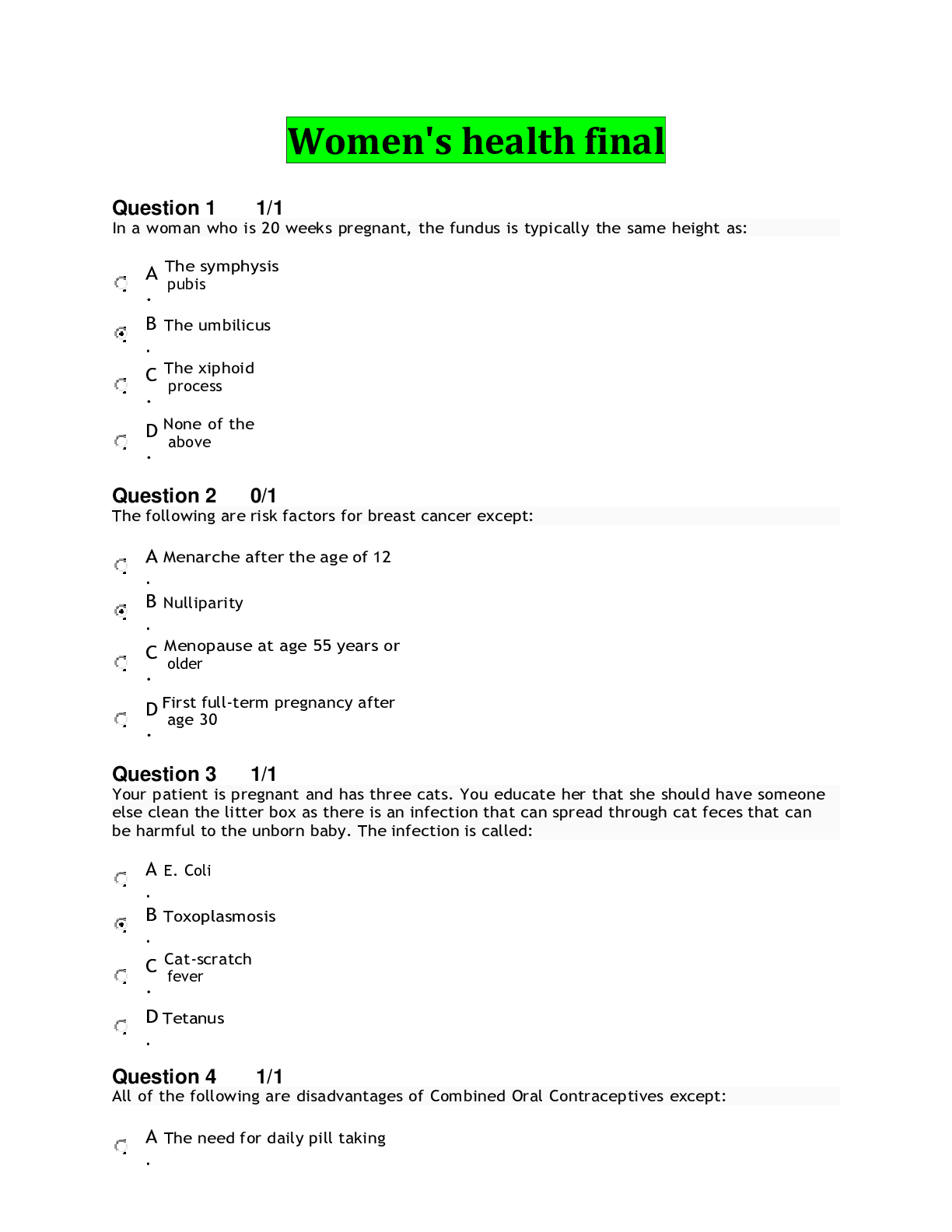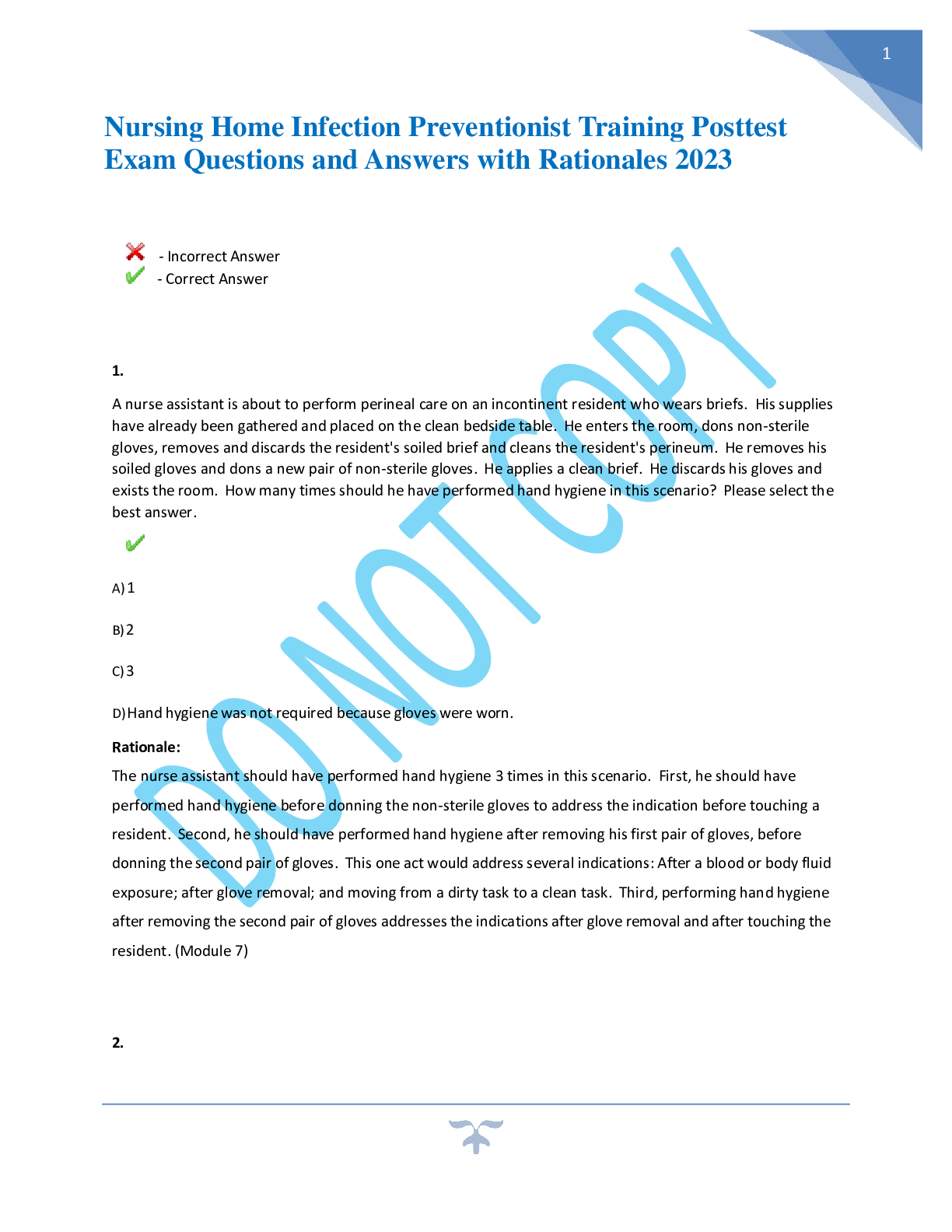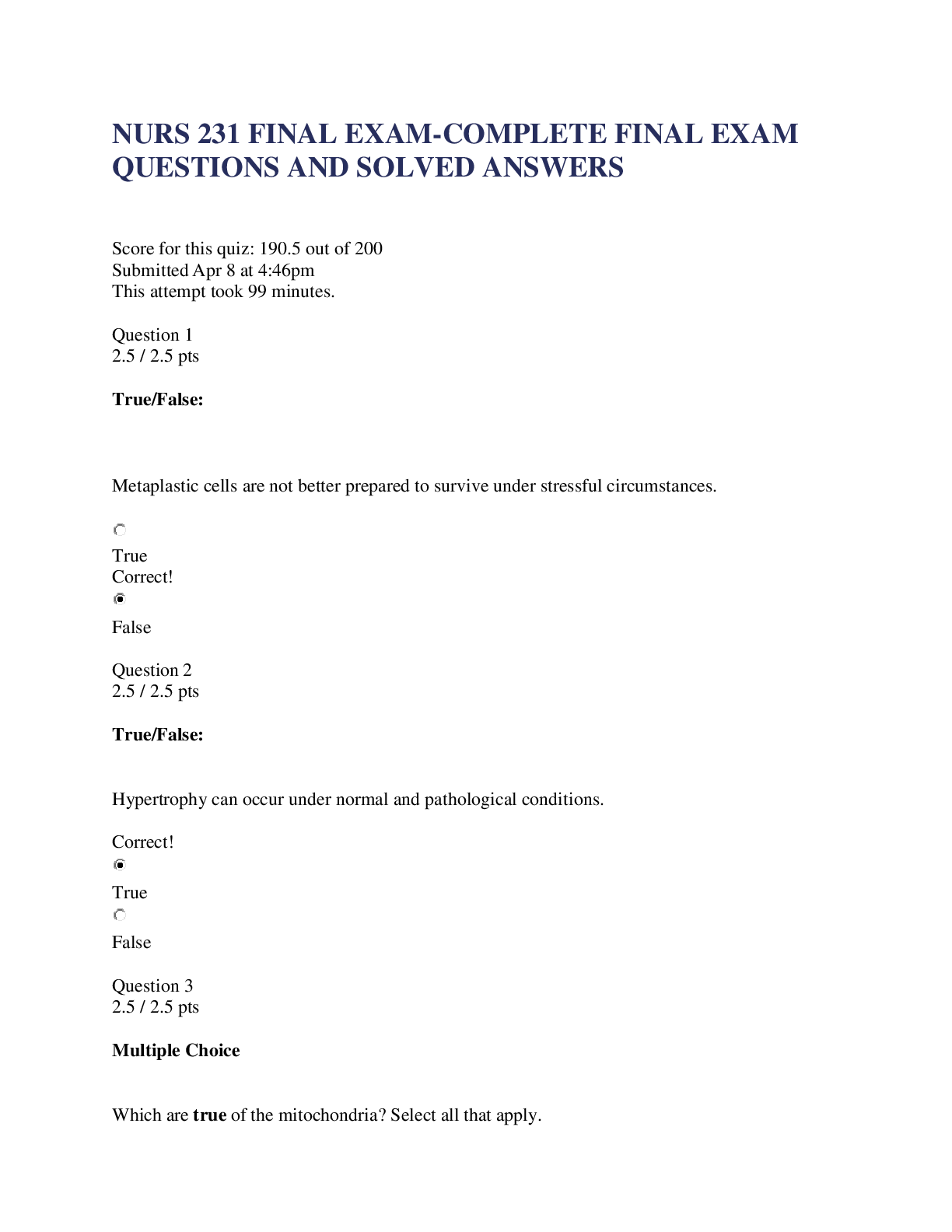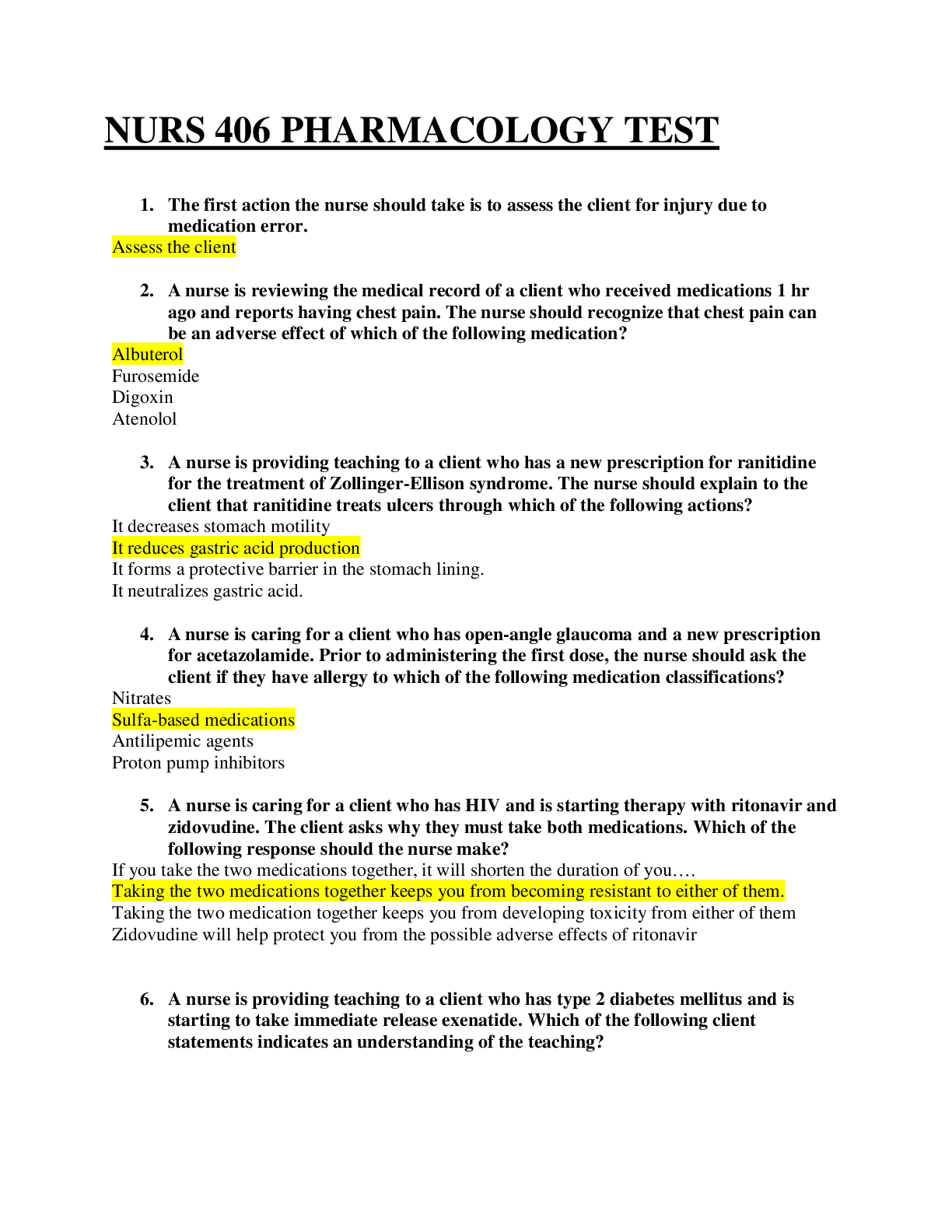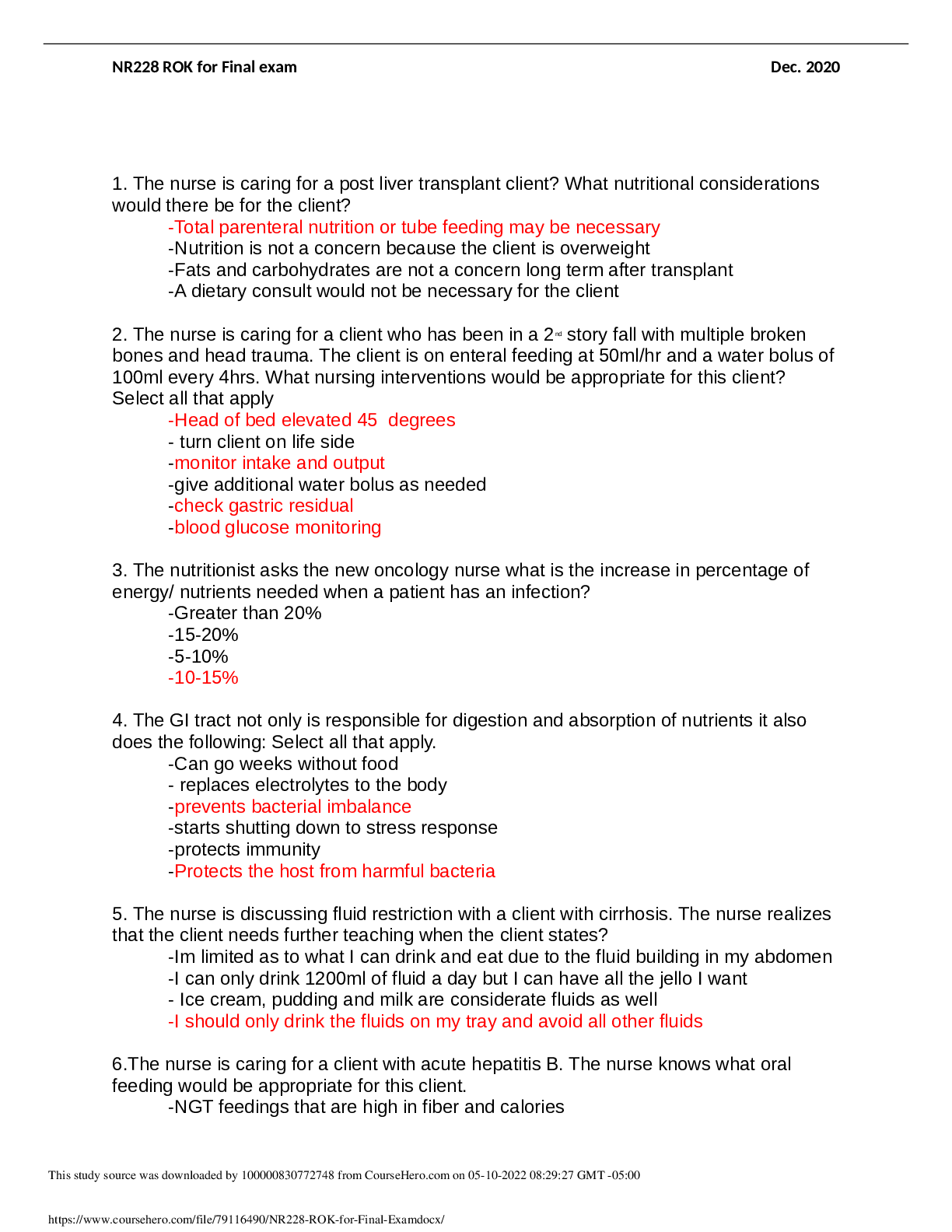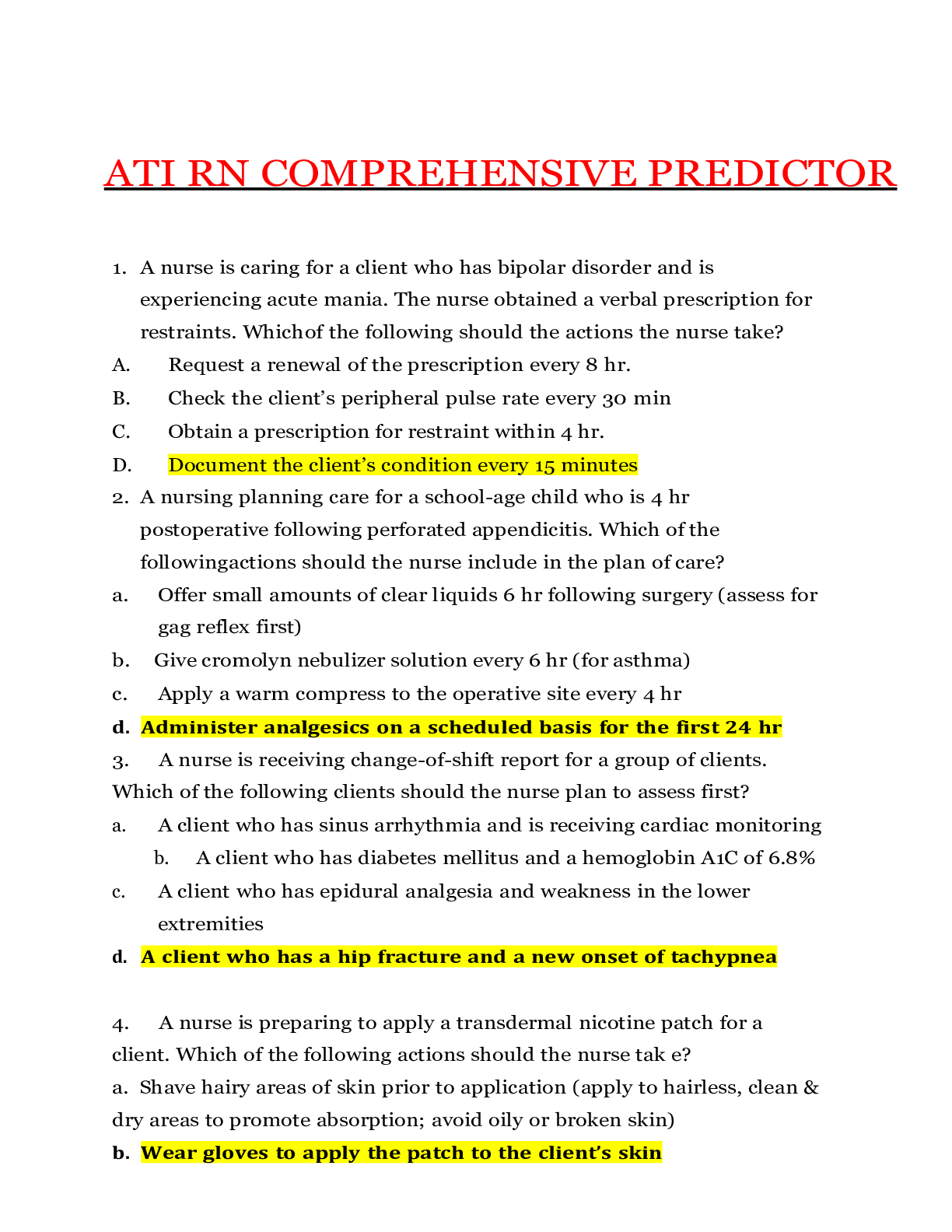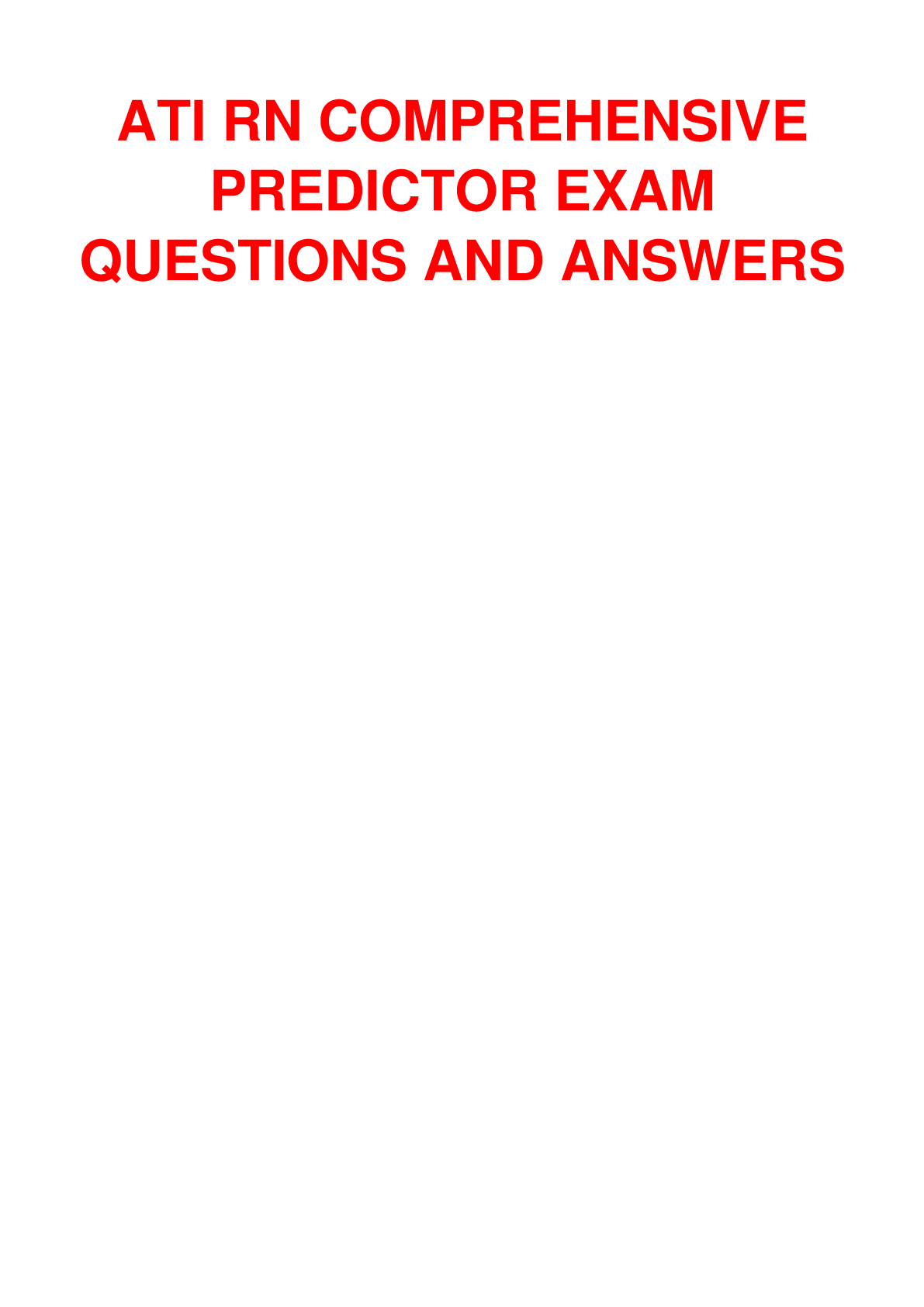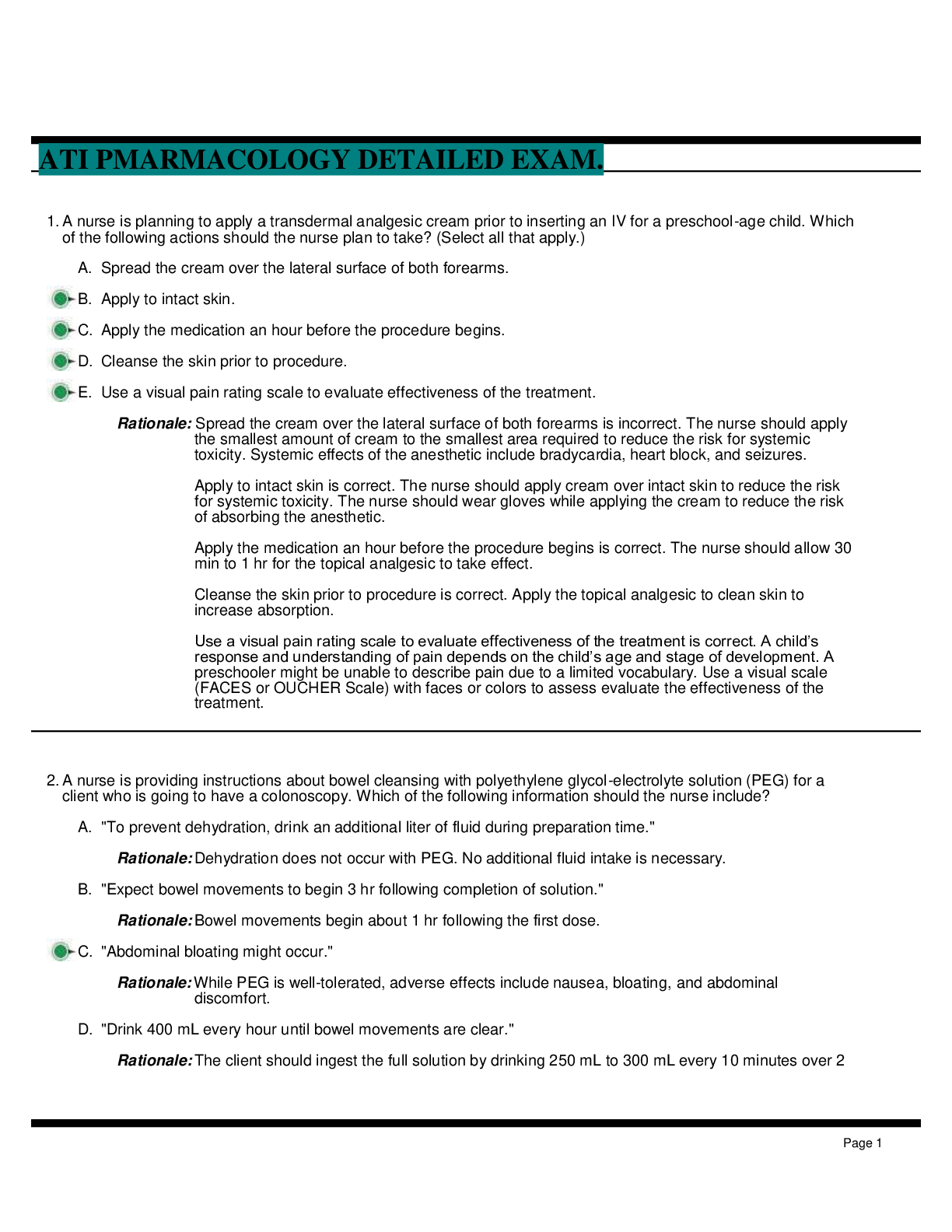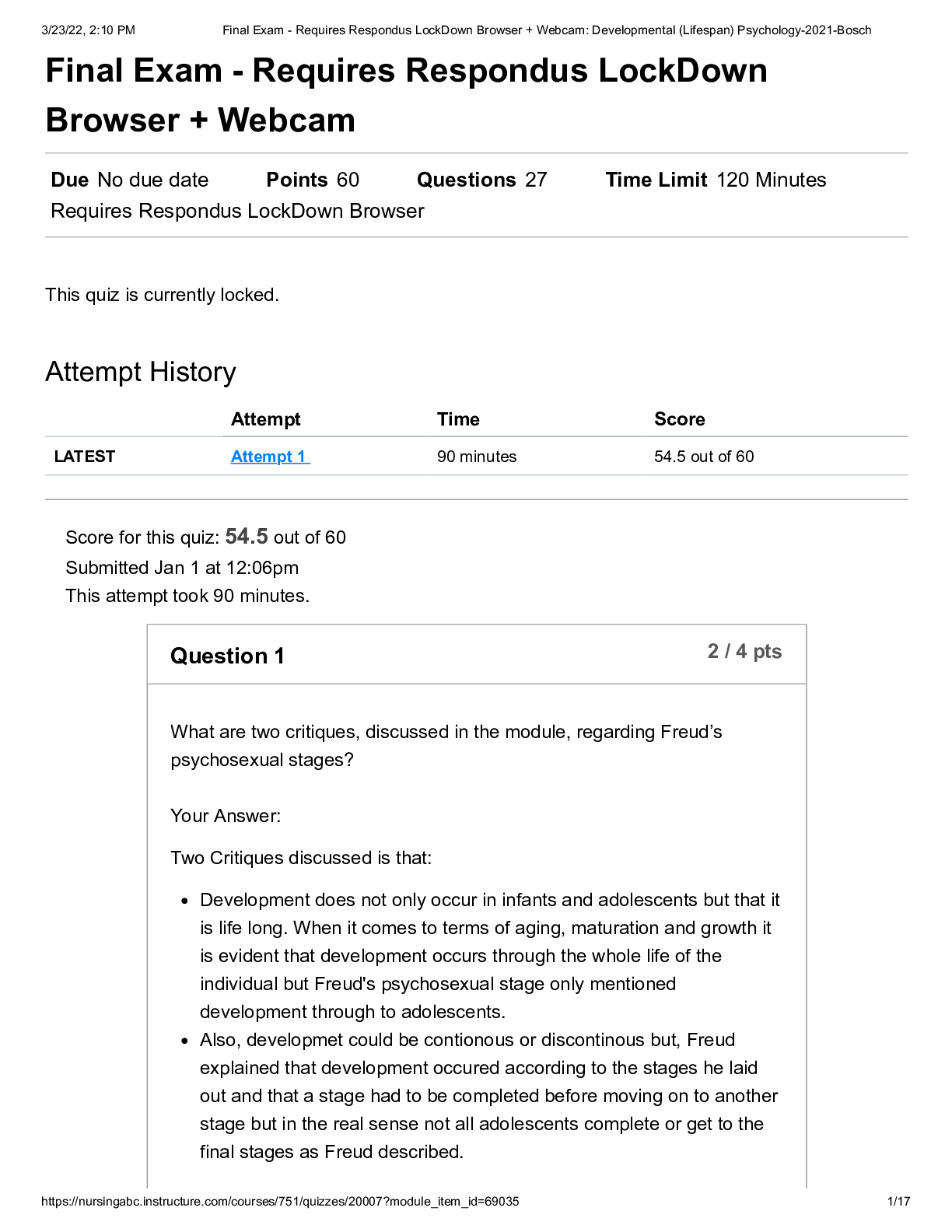*NURSING > EXAM > HESI RN Psychiatric-Mental Health Exit Exam Questions And Answers (Latest 2020/2021 Version) (All)
HESI RN Psychiatric-Mental Health Exit Exam Questions And Answers (Latest 2020/2021 Version)
Document Content and Description Below
HESI RN Psychiatric-Mental Health Exit Exam 1. A male client is admitted to the mental health unit because he was feeling depressed about the loss of his wife and job. The client has a history of alco... hol dependency and admits that he was drinking alcohol 12 hours ago. His temperature is 100.0 F, pulse is 100, and blood pressure is 142/100. The nurse plans to give the client lorazepam (Ativan) based on which priority nursing diagnosis? a. Risk for injury related to suicidal ideation. b. Risk for injury related to alcohol detoxification. c. Knowledge deficit related to ineffective coping. d. Health seeking behaviors related to personal crisis. 2. A nurse working in the emergency room of a children's hospital admits a child whose injuries could have resulted from abuse. Which statement most accurately describes the nurse's responsibility in cases of suspected child abuse? a. Obtain objective data such as x-rays before reporting suspicions. b. Confirm suspicions of abuse with the physician. c. Report any case of suspected child abuse. d. Document injuries to confirm suspected abuse. 3. A child is brought to the emergency room with a broken arm. Because of other injuries, the nurse suspects the child may be a victim of abuse. When the nurse tries to give the child an injection, the child's mother becomes very loud and shouts, "I won't leave my son! Don't you touch him! You'll hurt my child!" What is the best interpretation of the mother's statements? a. She is regressing to an earlier behavior pattern. b. She is sublimating her anger. c. She is projecting her feelings onto the nurse. d. She is suppressing her fear. 4. A client, who is on a 30-day commitment to a drug rehabilitation unit, asks the nurse if he can go for a walk on the grounds of the treatment center. When he is told that his privileges do not include walking on the grounds, the client becomes verbally abusive. Which approach should the nurse take? a. Ask the staff to escort the client to his room. b. Have the client ask his physician to change his privileges. c. Remind the client of the importance of following the rules. d. Disregard the client's inappropriate verbal outburst. 5. A client who is known to abuse drugs is admitted to the psychiatric unit. Which medication should the nurse anticipate administering to a client who is exhibiting benzodiazepine withdrawal symptoms? a. Perphenazine (Trilafon). b. Diphenylhydramine (Benadryl). c. Chlordiazepoxide (Librium). d. Isocarboxazid (Marplan). 6. A client is receiving substitution therapy during withdrawal from benzodiazepines. Which expected outcome statement has the highest priority when planning nursing care? a. Client will not demonstrate cross addiction. b. Co-dependent behaviors will be decreased. c. Excessive CNS stimulation will be reduced. d. Client's level of consciousness will increase. 7. A 45-year-old female client is admitted to the psychiatric unit for evaluation. Her husband states that she has been reluctant to leave home for the last six months. The client has not gone to work for a month and has been terminated from her job. She has not left the house since that time. This client is displaying symptoms of which disorder? a. Claustrophobia. b. Acrophobia. c. Agoraphobia. d. Necrophobia. 8. A 19-year-old female client with a diagnosis of anorexia nervosa wants to help serve dinner trays to other clients on a psychiatric unit. What action should the nurse take? a. Encourage the client's self motivation by asking her to pass trays for the rest of the week. b. Provide an additional challenge by asking the client to help feed the older clients. c. Suggest another way for this client to participate in the unit's activities. d. Tell the client that hospital guidelines allow only staff to pass the trays. 9. A female client with depression attends a group and states that she sometimes misses her medication appointments because she feels very anxious about riding the bus. Which statement is the nurse's best response? a. "Can your case manager take you to your appointments?" b. "Take your medication for anxiety before you ride the bus." c. "Let's talk about what happens when you feel very anxious." d. "What are some ways that you can cope with your anxiety?" 10. A woman brings her 48-year-old husband to the outpatient psychiatric unit and describes his behavior to the admitting nurse. She states that he has been sleepwalking, cannot remember who he is, and exhibits multiple personalities. The nurse knows that these behaviors are often associated with which condition? a. Dissociative disorder. b. Obsessive-compulsive disorder. c. Panic disorder. d. Post-traumatic stress syndrome. 11. At the first meeting of a group of older adults at a day care center for the elderly, the nurse asks one of the members what kinds of things she would like to do with the group. The older woman shrugs her shoulders and says, "You tell me, you're the leader." What would be the best response for the nurse to make? a. "Yes, I am the leader today. Would you like to be the leader tomorrow?" b. "Yes, I will be leading this group. What would you like to accomplish?" c. "Yes, I have been assigned to lead this group. I will be here for the next six weeks." d. "Yes, I am the leader. You seem angry about not being the leader yourself." 12. Over a period of several weeks, one male client participant of a socialization group at a community day care center for the elderly monopolizes most of the group's time and interrupts others when they are talking. What is the best action for the nurse to take in this situation? a. Talk to the client outside the group about his behavior. b. Ask the client to give others a chance to talk. c. Allow the group to handle the problem. d. Ask the client to join another group. 13. A client in the critical care unit who has been oriented suddenly becomes disoriented and fearful. Assessment of vital signs and other physical parameters reveal no significant changes, and the nurse formulates the diagnosis: "Confusion related to ICU psychosis." Which intervention is best to implement based on this client's behavior? a. Move all machines away from the client's bedside at once. b. Allay fears by teaching the client about disease etiology. c. Cluster care to allow for brief rest periods during the day. d. Encourage visitation by the client's family members. 14. A client on the psychiatric unit appears to imitate a certain nurse on the unit. The client seeks out this particular nurse and imitates her mannerisms. Which defense mechanism does the nurse recognize in this client? a. Sublimation. b. Identification. c. Introjection. d. Repression. 15. A nurse working on a mental health unit receives a community call from a person who is tearful and states, "I just feel so nervous all of the time. I don't know what to do about my problems. I haven't been able to sleep at night and have hardly eaten for the past 3 to 4 days." The nurse should initiate a referral based on which assessment? a. Altered thought processes. b. Moderate levels of anxiety. c. Inadequate social support. d. Altered health maintenance. 16. An anxious client expressing a fear of people and open places is admitted to the psychiatric unit. What is the most effective way for the nurse to assist this client? a. Plan an outing within the first week of admission. b. Distract her whenever she expresses her discomfort about being with others. c. Confront her fears and discuss the possible causes of these fears. d. Accompany her outside for an increasing amount of time each day. 17. Within several days of hospitalization, a client is repeatedly washing the top of the same table. Which initial intervention is best for the nurse to implement to help the client cope with anxiety related to this behavior? a. Administer a prescribed PRN anti-anxiety medication. b. Assist the client to identify stimuli that precipitates the ritualistic activity. c. Allow time for the ritualistic behavior, then redirect the client to other activities. d. Teach the client relaxation and thought stopping techniques. 18. The nurse is planning to initiate a socialization group for older residents of a long-term facility. Which information would be most useful to the nurse when planning activities for the group? a. Each resident's length of stay at this nursing home. b. A brief description of each resident's family life. c. The age and medication regimen of each group member. d. The usual activity patterns of each group member. 19. Which ego-defense mechanisms are exhibited by a client with a phobia related to refusal to leave home? a. Denial. b. Symbolization. c. Fantasy. d. Intellectualization. 20. A client who has been admitted to the psychiatric unit tells the nurse, "My problems are so bad. No one can help me." Which response would be best for the nurse to make? a. "How can I help you? Tell me more about your problems." b. "Things probably aren't as bad as they seem right now." c. "Let's talk about what is right with your life." d. "I hear your misery, but things will get better soon." 21. A 22-year-old male client is admitted to the emergency center following a suicide attempt. His records reveal that this is his third suicide attempt in the past two years. He is conscious, but does not respond to verbal commands for treatment. Which assessment finding should prompt the nurse to prepare the client for gastric lavage? a. He ingested the drug 3 hours prior to admission to the emergency center. b. The family reports that he took an entire bottle of acetaminophen (Tylenol). c. He is unresponsive to instructions and is unable to cooperate with emetic therapy. d. Those with repeated suicide attempts desire punishment to relieve their guilt. 22. A 68-year-old retired secretary is admitted to the psychiatric inpatient unit with a diagnosis of major depression. The initial nursing care plan includes the goal, "Assist client to express feelings of guilt." What is true about the goal statement referring to the client's depression? a. Implementation of this goal should be deferred until further data can be gathered. b. The depression is most likely age-related and will dissipate once she becomes accustomed to retirement. c. Depressed clients are often unaware of guilt feelings, and should be encouraged to increase self-awareness. d. Nursing goals should be approved by the treatment team before they are initiated. 23. The nurse is planning care for a 32-year-old male client diagnosed with HIV infection who has a history of chronic depression. Recently, the client's viral load has begun to increase rather than decrease despite his adherence to the HIV drug regimen. What should the nurse do first while taking the client's history upon admission to the hospital? a. Determine if the client attends a support group weekly. b. Hold all anti-depressant medications until further notice. c. Ask the client if he takes St. John's Wort routinely. d. Have the client describe any recent changes in mood. 24. The nurse admits a client with depression to the mental health unit. The client reports difficulty concentrating, losing 10 pounds in two weeks, and sleeping 12 hours a day. Which outcome is most important for the client to meet by discharge? a. Tries to interact with a few peers and staff. b. Reports feeling better and less depressed. c. Sits attentively with peers in group therapy. d. Easily awakens for morning medications. 25. Which diet selection by a depressed client taking tranylcypromine sulfate (Parnate), an MAO inhibitor, indicates to the nurse that the client understands the dietary restrictions imposed by this medication regimen? a. Hamburger, french fries, and chocolate milkshake. b. Liver and onions, broccoli, and decaffeinated coffee. c. Pepperoni and cheese pizza, tossed salad, and soda. d. Roast beef, baked potato with butter, and iced tea. 26. A 72-year-old female is admitted to the psychiatric unit with a medical diagnosis of major depression. Which statement by the client would be of greatest concern to the nurse and would require further assessment? a. "I think my cat is going to die." b. "I don't feel like eating this morning." c. "I just went to my friend's funeral." d. "Don't you have more important things to do?" 27. A 33-year-old is admitted to a Psychiatric facility with a medical diagnosis of major depression. When the nurse is assigning the client to a room, which roommate is best for this client? a. A 35-year-old who recently attempted suicide. b. A manic client who has started lithium carbonate treatment. c. A client who is bipolar and is pacing the floor telling jokes to everyone. d. A paranoid client who believes that the staff is trying to poison the food. 28. A client is admitted with a diagnosis of depression. The nurse knows that which characteristic is most indicative of depression? a. Grandiose ideation. b. Self-destructive thoughts. c. Suspiciousness of others. d. Negative views of self. 29. A 22-year-old female is admitted to the psychiatric unit from the medical unit following a suicide attempt with an overdose of diazepam (Valium). When developing the nursing care plan for this client, what intervention would be most important to include? a. Assist the client to focus on her strengths. b. Set limits on the client's self-defacing comments. c. Remind the client of daily activities in the milieu. d. Assist the client to identify why she was self-destructive. 30. A female client in an acute care facility has been on antipsychotic medications for the past three days. Her psychotic behaviors have decreased and she has had no adverse reactions. On the fourth day, the client's blood pressure increases, she becomes pale and febrile, and demonstrates muscular rigidity. What action should the nurse initiate? a. Place the client on seizure precautions and monitor frequently. b. Take the client's vital signs and notify the physician immediately. c. Describe the symptoms to the charge nurse and document them in the client's record. d. No action is required at this time as these are known side effects of her medications. 31. A 27-year-old female is admitted to the psychiatric hospital with a diagnosis of bipolar disorder, manic phase. She is demanding and active. What intervention should the nurse include in this client's plan of care? a. Schedule the client to attend various group activities. b. Reinforce the client's ability to make her own decisions. c. Encourage the client to identify feelings of anger. d. Provide a structured environment with little stimuli. 32. A manic depressive male client on the psychiatric unit becomes loud, and shouts at one of the nurses, "You fat tub of lard, get something done around here." What is the best initial action for the nurse to take? a. Have the staff escort the client to his room. b. Tell the client that his behavior will be recorded in his record. c. Redirect the client by asking him to play card games with peers. d. Review the medication record for an antipsychotic drug. 33. A 45-year-old male client tells the nurse that he used to believe that he was Jesus Christ, but now he knows he is not. Which response is best for the nurse to make? a. "Did you really believe you were Jesus Christ?" b. "I think you're getting well." c. "Others have had similar thoughts when under stress." d. "Why did you think you were Jesus Christ?" 34. A 38-year-old woman is admitted with a diagnosis of paranoid schizophrenia. When her tray is brought to her room, she refuses to eat and tells the nurse, "I know you are trying to poison me with that food." What response by the nurse is the most therapeutic? a. "I'll leave your tray here; I am available if you need anything else." b. "You're not being poisoned. Why do you think someone is trying to poison you?" c. "No one on this unit has ever died from poisoning. You're safe here." d. "I will talk to your physician about the possibility of changing your diet." 35. A 35-year-old male client admitted to the psychiatric unit of an acute care hospital tells the nurse that he believes someone is trying to poison him. The client's delusions are most likely related to which factor? a. Authority issues in childhood. b. Anger about being hospitalized. c. Low self-esteem. d. Phobia of food. 36. A 35-year-old male client who has been hospitalized for two weeks for paranoia complains continuously to the staff that someone is trying to steal his clothing. What is the correct action for the nurse to take based on this client's complaints? a. Enroll the client in an exercise class to promote self-esteem. b. Place a lock on the client's closet to deter any theft. c. Promote extinction of the ideation by ignoring the client. d. Explain to the client that these suspicions are false. 37. An 86-year-old female client with Alzheimer's disease is wandering the busy halls of the extended care facility and asks the nurse, "Where should I stand for the parade?" Which response is best for the nurse to provide? a. "Anywhere you want to stand as long as you do not get hurt by those in the parade." b. "You are confused because of all the activity in the hall. There is no parade." c. "Let's go back to the activity room and see what is going on in there." d. "Remember I told you that this is a nursing home and I am your nurse." 38. The nurse is planning discharge for a male client with schizophrenia. The client insists that he is returning to his apartment, although the physician informed him that he will be moving to a boarding home. What is the most important nursing diagnosis for discharge planning? a. Ineffective denial related to situational anxiety. b. Ineffective coping related to inadequate support. c. Social isolation related to difficult interactions. d. Self-care deficit related to cognitive impairment. 39. A client who is diagnosed as schizophrenic is admitted to the hospital. The nurse assesses the client's mental status. Which assessment finding is most characteristic of a client with schizophrenia? a. Mood swings. b. Extreme sadness. c. Manipulative behavior. d. Flat affect. 40. On admission, a highly anxious client is described as delusional. The nurse understands that delusions are most likely to occur with which disorder? a. Dissociative disorders. b. Personality disorders. c. Anxiety disorders. d. Psychotic disorders. 41. A 25-year-old female client has been particularly restless and the nurse finds her trying to leave the psychiatric unit. She tells the nurse, "Please let me go. I must leave because the secret police are after me." What response is best for the nurse to make? a. "No one is after you, you're safe here." b. "You'll feel better after you have rested." c. "I know you must feel lonely and frightened." d. "Come with me to your room and I will sit with you." 42. A client who is being treated with lithium carbonate for manic depression begins to develop diarrhea, vomiting, and drowsiness. What action should the nurse take? a. Notify the physician immediately and force fluids. b. Prior to giving the next dose, notify the physician of the symptoms. c. Record the symptoms and continue medication as prescribed. d. Hold the medication and refuse to administer additional amounts of the drug. 43. A male schizophrenic client, taking fluphenazine deconate (Prolixin deconate), is being discharged in the morning. A repeat dose of medication is scheduled for 20 days after discharge. The client tells the nurse that he is going on vacation and will return in 18 days. Which statement by the client indicates a need for health teaching? a. "I am going to have lots of time in the sun." b. "While I am on vacation, I will not eat or drink anything that contains alcohol." c. "I will notify the doctor if I have a sore throat or flu-like symptoms." d. "I will continue to take my benzotropine mesylate (Congentin) every day." 44. An adult client with a medical diagnosis of substance abuse and schizophrenia was recently switched from oral fluphenazine HCl (Prolixin) to IM fluphenazine decanoate (Prolixin Decanoate) because of medication noncompliance. What is important to teach the client and family about this change in medication regimen? a. Long-acting medication is more effective than daily medication. b. A client with substance abuse must not take any oral medications. c. There will continue to be a risk of alcohol and drug interaction. d. Support groups are only helpful for substance abuse treatment. 45. The nurse develops a plan of care for a client with symptoms of paranoia and psychosis. The priority nursing diagnosis is "Impaired social interactions related to inability to trust." Which intervention is most important for the nurse to implement? a. Greet the client by first name during each social interaction. b. Determine if the client is experiencing auditory hallucinations. c. Introduce the client to peers on the unit as soon as possible. d. Assign the client to a group about developing social skills. 46. The nurse is conducting discharge teaching for a client who has schizophrenia and plans to live in a group home. Which statement is most indicative of the need for careful follow-up after discharge? a. "Crickets are a good source of protein." b. "I have not heard any voices for a week." c. "Only my belief in God can help me." d. "Sometimes I have a hard time sitting still." 47. An 8-year-old child is seen in the clinic with a green vaginal discharge. What action is most important for the nurse to implement? a. Assess the child's blood pressure. b. Counsel the child to wear cotton underwear. c. Report as suspected child abuse. d. Determine if the child takes bubble baths. 48. Clients are preparing to leave the mental health unit for an outdoor smoke break. A client on constant observation cannot leave and becomes agitated and demands to smoke a cigarette. What action should the nurse take first? a. Remind the client to wear the nicoderm (nicotine) patch. b. Determine if the client still needs constant observation. c. Encourage the client to attend the smoking cessation group. d. Explain that clients on constant observation cannot smoke. 49. The nurse collaborates with the nursing staff about the plan of care for a client who is very depressed. What is the most important intervention to implement during the first 48 hours of hospital admission? a. Assign the client a case manager. b. Document activities. c. Maintain safety in the client's milieu. d. Identify current psychosocial stresses. 50. The charge nurse collaborates with the nursing staff members about the plan of care for a client who is depressed. What is the most important intervention to implement during the first 48 hours after the client's admission to the unit? [Show More]
Last updated: 1 year ago
Preview 1 out of 14 pages
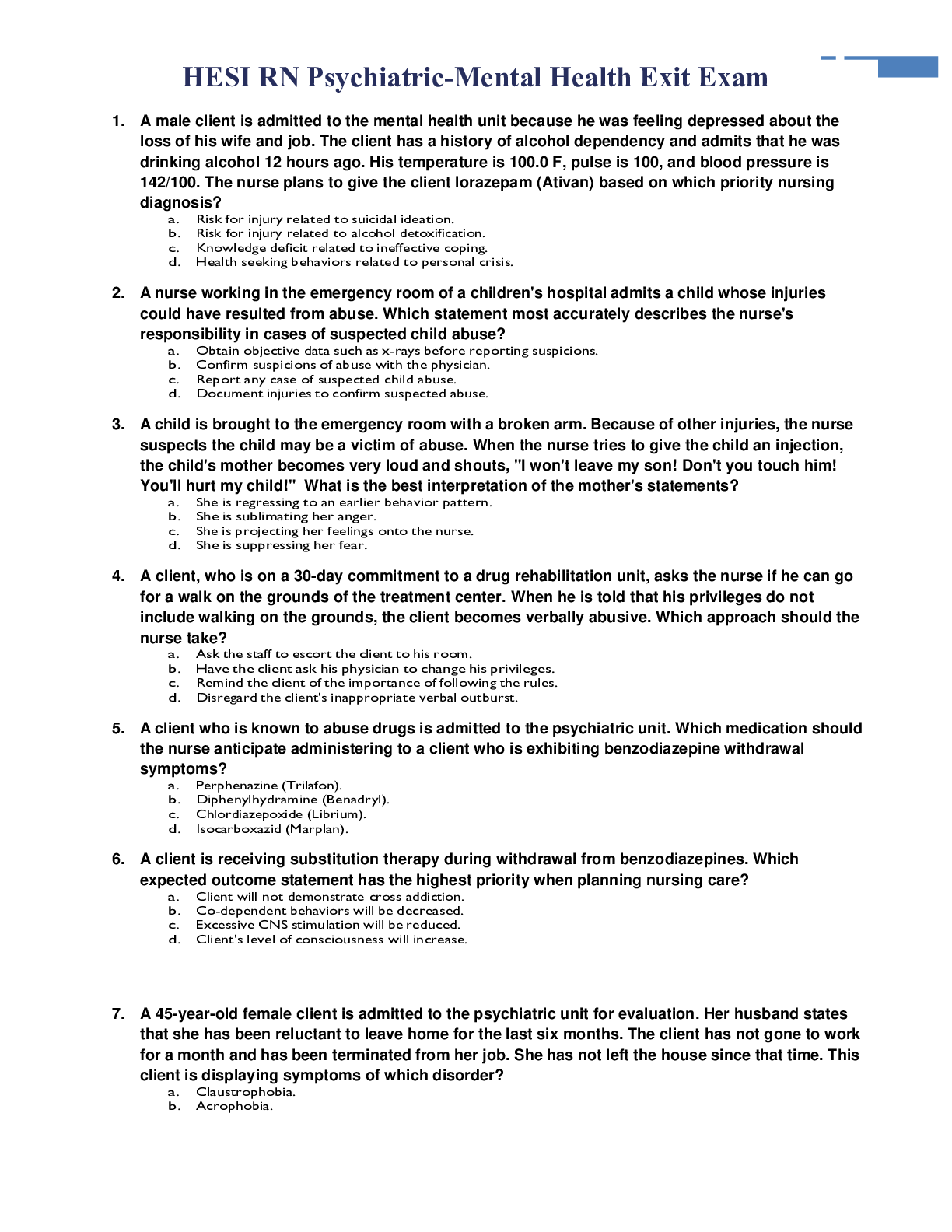
Reviews( 0 )
Document information
Connected school, study & course
About the document
Uploaded On
Apr 26, 2021
Number of pages
14
Written in
Additional information
This document has been written for:
Uploaded
Apr 26, 2021
Downloads
0
Views
41


